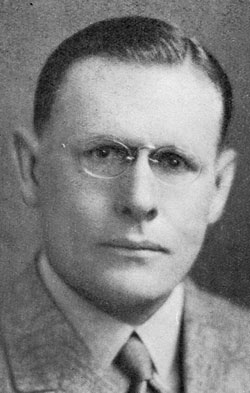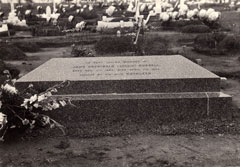
For the descendents of Richard Dearie and his son John Russell
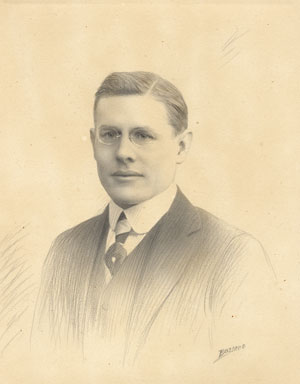
John Archibald ( Archie) Russell
11 November 1882-
7 April 1933
Businessman
"So far as there is anything of the sort in this country I might almost call myself a financier"
The Straits Times, 3 April 1924
PART TWO
1922-1933
1922
Matches.
In February Malayan Matches were becoming the butt of jokes in the press, and the directors reported in March that manufacture had still not commenced. It was not until June that matches began to be produced on a commercial scale and were available in shops in Singapore by July. In September the Malayan Observer wrote a long article describing the factory. From October the new manager was Mr. Passmore. However he appears not to have lasted long, since it was reported in December that a Mr. Grocutt was acting as a temporary manager.
The second annual report in October said that 15,500 gross have been manufactured. At the 2nd A.G.M. on 26 October Archie as chair reported that the company had had to be supported by funds from J. A. Russell and Co. He was cautious in his speech about whether the company would be successful or not. There had been a decision not to advertise them widely which commentators later decided was a mistake. It appears to be only the wholesale dealer who advertised them.
See right: From The Malay Mail, 15 November, p. 15.
Coconuts.
Archie was present at the eleventh annual meeting of Selangor Coconuts, in November, where he seconded the report and accounts.
Tin
Mr. W. F. Nutt whom Archie had known from his first job at The Straits Trading Company in 1899, and who had become their managing director in 1918, resigned from his job after being accused of “reckless speculation” by the shareholders at a meeting on the 16 January. One of them was Frederick Peck, who had criticised Mr. Nutt for having too many other directorships. It was the first occasion that a meeting of the Straits Trading Company had been reported in the Press. Archie was present at Mr. Nutt’s leaving tea party, organised for him by the Chinese Miners. Mr. Nutt was greatly respected by them because of his work for the tin mining community for over 20 years. Mr. Nutt’s description of the state of tin mining as reported in the Straits Times of 20th January is a very comprehensive account of the difficulties of the industry from 1914 to the present. Mr. Kia Peng was cheered when he said;” Mr. Nutt has our deepest respect and sympathy for being the victim of what is I think, a shortsighted and I trust only a temporary deviation from the Straits Trading Company’s traditional policy of preserving the local tin mining industry even if it means some little and momentary curtailing of its own consistent earning of phenomenally high profits.
In November a report from Mambau Tin shows that J. A. Russell is on the board of the company, and he is re elected as a director at their second annual meeting in November
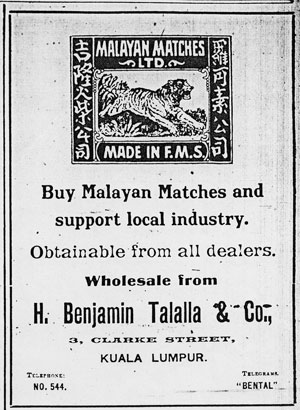
United Engineers.
In October the director’s report for United Engineers gave a dividend of 7%. Archie retired as a director and offered himself up for re- election. At their annual general meeting the Managing Director, Mr. V. V. Lemberger resigned after protests from shareholders. Archie was re elected as a director.
Rubber
In March Archie chaired the twelfth annual meeting of New Serandah Rubber. In his speech he said the company was sound but that no dividend would be paid. Losses had been heavy due to the agreed restriction on tapping.
Although not present at the meeting Archie was re elected as a director of Utan Simpan Rubber at its 12th annual meeting in April.
He was present at the 12th annual meeting of Kamasan Rubber, which had earned a profit and made a dividend of 5%.
In October Archie chaired the sixth annual meeting of Amalgamated Malay, another rubber company, and was re elected as a director at the meeting.
Committees.
In February Archie was appointed to the Retrenchment Committee to enquire into Government spending and salaries, and in May he was still a member of the Railway Advisory Board.
The Prince’s visit.
In March the Prince of Wales visited Kuala Lumpur. Archie was among about 90 guests who shook the Prince’s hand at a ceremony outside the Selangor Club. The following day the prince had lunch at the splendidly decorated Railway Station where Archie was among 50 guests at the main table with the Prince, and again shook his hand.
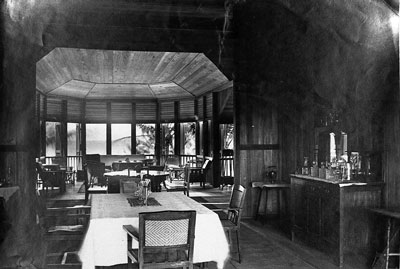
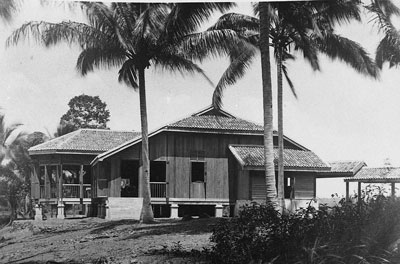
Mr. Peck.
On 13 September Mr Peck had his suit to sue J.A. Russell, J. A. Russell and Co. and Malayan Collieries granted. On 5 October the papers reported that Mr. Peck’s civil suit was down to be heard in a month’s time. Mr. Bailey, solicitor for Malayan Collieries had delayed the action because Malayan Collieries had still not decided whether to be plaintiffs with Mr. Peck or defendants. They were waiting for the report of the three referees. Mr. Hastings, solicitor for Mr. Peck complained about the delay but finally had to accept that the case be put on next month’s list. On 10 October Archie was elected a director of the Eastern Mining and Rubber Co.
On 31 October the news from the referees report was that Malayan Collieries would not support Mr. Peck’s case against J. A. and Russell and Co. On 7 November Archie’s solicitor Mr. Shearn applied to stop Hong Guan’s case against Archie until the results of Mr. Peck’s case were known. Sir Lionel Woodward, Chief Judicial Commissioner, did not allow Mr. Shearn’s application and ruled that the two cases were distinct and that Hong Guan’s could be fixed for December.
On 4 November Mr. Hopson Walker, a Malayan Collieries shareholder, wrote to the Straits Times, expressing surprise at Malayan Collieries lack of support for Mr. Peck, and calling for shareholders to support him. Meanwhile on 7 November Hong Guan was in court in Singapore for debt, (not for the first time), and was told to pay up within 14 days or he would be arrested and put in prison. Hong Guan’s case against Archie came before the Supreme Court in Kuala Lumpur on 6 November. The lawyers argued about whether the case should stand over until Peck v. Russell was heard. Sir Lionel Woodward decided that it should not and it was scheduled for December.
On 21 November another extraordinary meeting of Malayan Collieries was held. Archie was present at the meeting but did not chair it. The referees report was not allowed to be seen due to the impending court case, but it was revealed that the referees had decided not to support Mr. Peck and the Company would be defendants in the case. The independent directors of the Company’s only criticism of Archie was that they: “candidly admit their regret that Mr. Russell relying on Article 92, elected to keep them at arm’s length and to deal with the Company as a principal. Further more they think in making so large a profit he did not display a generosity to the Company which might perhaps have been looked for”. A member of the press was at the meeting and nearly 4,000 words were devoted to it in the Straits Times of 27 November. Mr. Peck was angry that the report had not been published but that the main decision had been revealed which meant that the other shareholders who supported him were withdrawing their help for his case, which had been prejudiced. Despite his best efforts and questions about proxies he and his supporters were in a minority and were outvoted, and the shareholders voted to agree with the referees decision and not to support his case.
In November Archie was approached by a friend of Hong Guan’s called R. H. Legge, who suggested that Hong Guan ‘s case was a strong one and he ought to settle out of court. Archie refused. By 6 December the Kuala Lumpur Supreme Court had set Mr. Peck’s case for hearing on the 18th, while Hong Guan’s case was put back to January. On 7 December Archie met Hong Guan’s father, Ng Sung Teck, who he had not met for two years, Sung Teck says his son is a bad son, and had ruined his father through his dishonesty. Archie expressed his sympathy. On14 December Archie left Kuala Lumpur for Singapore. By 18 December Mr. Peck was back in Kuala Lumpur for the case. Sir Arthur Adams, engaged as counsel by Archie, was due to arrive. The case began on 18 December before Mr. Justice Farrer-Manby, with a very lengthy statement of defence from Archie and J. A. Russell and Co., going through Mr. Peck’s accusations paragraph by paragraph. Sir. Arthur argued that a charge of fraud against a director did not allow a shareholder to take action unless he had the majority of the shareholder’s votes. During the whole of Wednesday he continued to argue that Mr. Peck was not entitled to sue the Company, while Mr. Hastings for Mr. Peck argued that since the directors had refused to sue, his client could. The case continued until the holiday. By 23 December Archie had produced the documents required by the Supreme Court for Hong Guan’s case.
Coal and Litigation.
In January Malayan Collieries announced a dividend of 10 %. On the 26 January the papers reported that the monthly wages bill, ($100.000) to Malayan Collieries was accompanied by an armed guard, because an attack had been expected.
On 31 March a letter appeared in the Straits Times, which was to be the start of a series of allegations against Archie and his company. The letter began: “What is wrong with Malayan Collieries?” It pointed out that they have not held an annual meeting in 1921, had changed the date of the end of their financial year, bought a very expensive new property and the shares had slumped and rumours abounded. It was signed “Shareholder”. The letter was responded to on 4 April with an explanation from J. A. Russell as agents of Malayan Collieries saying a circular had been sent to all shareholders and that a meeting would be held before the end of the month. The Collieries eighth Annual Report was sent to shareholders and published in the papers on 26 and 27 April. It covered a period of 18 months, with information on both mines.
Hong Guan
On 27 April Hong Guan wrote Archie a letter, claiming that their partnership over the Pamoekan Bay option meant that he, Hong Guan, was owed a third of the profits, and asking for 18,666 shares at 20 dollars each. He had been to see a solicitor and enclosed their opinion: "April 27, 1922: - 227, Telok Ayer Street. Singapore, April 27, 1922. Dear Mr. Russell, - I enclose herewith copy of an opinion which I have received from a firm of Singapore Solicitors in relation to our deal over the Goenoeng Batoe Besar Mine and shall be glad to hear from you thereon. If I am compelled to take action I shall make a claim for 18,666 2/3 shares at the price of Dols. 20 each, as I can prove that I sold my own shares at about that price. I am, however, prepared to consider a settlement, provided it is put through at once, and I should be obliged if you would let me know from you by return mail. Yours faithfully, (Sgd.) NG HONG GUAN." Archie did not reply to the letter because, as he said later in court, he considered “ the complaint a preposterous one” (The Straits Times, 2 May 1923, Page 10) In May Hong Guan tried to serve a writ on Archie in the Singapore Supreme Court for a share of the profits made in the resale of the mine to Malayan Collieries, claiming that he and Archie were partners in acquiring it.
8th A.G.M.
On 6th May the Straits Times gave a detailed report of the Malayan Collieries 8th Annual meeting. Archie as chairman gave details of the new Pameokan Bay Colliery. Fred Peck, representing a few shareholders from Singapore questioned Archie about its purchase and its resale to Malayan Collieries. Archie did not answer the questions but asked Mr. Peck how many shareholders he represented. Mr. Peck had been to the registrar of Companies and had gathered information in Singapore. He informed the meeting that in 1920 Archie bought the property as J. A. Russell and Co. for $600.000 in cash and 20.000 shares, and sold it on to Malayan Collieries for $600.000 in cash and 100.000 shares. “A profit of 80.000 shares, of a nominal value of $800.000 and calculating on the same value as the shares given to the Dutch Company as part consideration the difference amounts to more than $2,000.000.” Mr. Peck suggested that it was Archie’s duty to buy it for Malayan Collieries since Archie was acting as their agents as well as being a Director. As Mr. Peck sat down a gust of wind blew all the pencils and papers onto the floor and Archie joked “We seem to be having a breeze” at which there was laughter. He then said he doubted if Mr. Peck had the right to ask some of his questions, and did not see what the use would be to give answers. He then read from a previously written statement. He explained that the option was time limited, that he abstained from voting when Malayan Collieries decided to buy it and that in the Autumn of 1920 the slump in coal prices had not begun and he could have kept it for J. A. Russell to develop or have floated it as a separate company. He explained that J. A. Russell had bailed out Malayan Collieries in times of difficulty and he would do nothing to damage the company. He then moved to a vote but Mr. Peck persisted in asking that full information on the transaction be given to shareholders. Archie clarified some of the dates. Mr. Peck asked for the exact date that J. A. Russell received the option. Archie ignored him and put the report and accounts to the meeting to be adopted. Mr. Peck requested that the meeting was adjourned, but his amendment was lost.
Fred Peck read the coverage of the meeting in the Straits Times and on 9 May wrote them a letter complaining of inaccurate reporting. The reporter who wrote the article for the Malay Mail, (which had been copied by the Straits Times), wrote to the paper on 11 May, defending the accuracy of his shorthand, and saying that at the reporter’s request Archie had not only read his notes to him but had had them typed up by a clerk and given to him.
On 11 May an editorial in The Singapore Free Press and Mercantile Advertiser pointed out that whatever the public thought of Mr. Peck, Archie had a conflict of interest; “The point we wish to make is that a firm acting as the agents or secretaries of a Company ought not to control the destinies of a public limited company to which the public has contributed capital, and that the secretarial or managerial firm ought to be extremely chary of putting members of its own firm on the directorate.” and that when someone is an agent and a director “he will find it extremely difficult to differentiate his functions”. They also pointed out that it was difficult to find directors who are independent and that shareholders ought to elect more unbiased men. They finished by saying that placing a member of a firm of secretaries or agents in the premier place of chairman of the board of directors was an objectionable custom that they condemned.
A day later on 12 May another shareholder wrote to the Straits Times asking how much profit J. A. Russell and Co. made from the sale of Paemoekan Bay and demanding a government enquiry. A day later on Saturday 13 May the Straits Times Leader article commented on the allegations against Archie, suggesting that it was probable that J. A. Russell and Co. did acquire the option for the property but that the main question was: should they receive 100 per cent profit in passing it on to Malayan Collieries, which “Even after allowing for all reasonable claims, it appears to be grossly excessive” and that: “It seems to us, therefore, that J. A. Russell and Co. where under a moral, if no other form of obligation to seek options on behalf of the Colliery Company, and to be content with a moderate remuneration for their services in so doing.” On 16 May Fred Peck sent another letter to the Straits Times, as did another shareholder who suggested that Mr. Peck represent the shareholders in securing an explanation. On the same day Archie’s wrote to the Straits Times, in response to Saturday’s Leader and said that he had thought his answer at the meeting was sufficiently full and conclusive but that he will set out the circumstances in more detail, however but it all took place 18 months ago and he is very busy at the moment. Another letter from a shareholder suggested that they subscribe to Mr. Peck to support him to look after their interests, a further letter on 17 May agreed.
Hong Guan issued a writ against Archie in Singapore on 18 May. There was a lull in the letters for 10 days until another letter on 26 May demanded Archie’s answer. On 5 and 6 June the Straits Times and the Malay Mail carried J. A. Russell and Co.’s detailed reply, which was a copy of a circular that had been sent to all the shareholders. It refuted the allegation that the option on the Poemoekan mine belonged to Malayan Collieries and was diverted to J. A. Russell and Co., in order for them to make a profit. In great detail, (nearly 6,000 words) the circular set out the process by which Ng Hong Guan, acquired the option and sold it to J. A. Russell and Co., and they sold it on to Malayan Collieries. It considered that J. A. Russell and Co. were independent and under no moral obligation to Malayan Collieries, and that it was a transaction in the ordinary way of business: “ and we feel confident that …it must be apparent that we have done nothing contrary to our duties as Secretaries and Managing agents of Malayan Collieries Ltd.” They were not prepared to discuss the profit they made: “the amount which in turn has to be paid to prior vendors and others, together with the names and nature of the interests of such persons is no business of the purchaser.” The circular was summarised and discussed in The Singapore Free Press and Mercantile Advertiser of 7 June, who pointed out that Mr. Peck will have something to say about it and that the issue is:” the more complicated because of the confusion between Mr. Russell himself, Mr. Russell as a partner of J. A. Russell and Co. and Mr. Russell as the agent and a director of the Malayan Collieries". On 9 June Mr. Peck’s response was published. Included in it were two letters written by Archie to Ng Hong Guan, which he said, proved that Archie was acting on behalf of Malayan Collieries.
On 21 June Mr. Justice Barrett- Lennard, decided that Hong Guan’s writ in Singapore must be set aside and the correct jurisdiction area was Kuala Lumpur not Singapore. On 24 June Mr. Peck sent copies of documents to shareholders with a view to raise subscriptions to finance legal proceedings against J. A. Russell and Co. On 28 June the Straits Times carried a notice to shareholders by Malayan Collieries saying the board had pursued the matter and decided the allegations against J.A. Russell and J. A. Russell and Co. were unfounded and that the company had no cause to take action. The board had decided to give shareholders the opportunity to either endorse the board’s decision or to refer the matter to independent referees and would call a meeting.
More letters to the papers followed this announcement. A writer calling himself “Justice” asked for Hong Guan to hand over all his relevant original documents. A writer from Penang suggested that far from being independent “Messrs. J. A. Russell and Co. without making use of their position, as Managing Agents and Secretaries, could not have carried through the deal.” And that a firm which had generated the greatest admiration has caused keen disappointment and distrust. Could J. A. Russell and Co., admit they have made a mistake and make some compensation? It would avoid costly litigation and go some way to restoring confidence to the shareholders. A writer calling himself “All Clear” asked for Hong Guan to come forward and publish his version of events.
In July Mr. Peck commenced legal action against Archie. An Extraordinary General Meeting of the Collieries was announced to be held on 16 August, and a letter from “Waverer” asked for Hong Guan to publish a statement before the meeting was held, to help shareholders decide whether to support Mr. Peck or not. On 2 August, another letter to the papers asked how information held by Hong Guan could be elicited from him before the meeting. Could his solicitors be contacted and who had chosen the referees? A further letter on 10 August suggested the referees were not qualified to judge the issue and that a barrister should be used. On 4 August Mr. Peck through his solicitors sent in an alternative resolution asking shareholders to vote to support his action against J. A. Russell and J. A. Russell and Co., and that Malayan Collieries should act as plaintiffs with him not as defendants in the case.
On 16 August the Malayan Collieries Extraordinary meeting was held. Archie as chairman gave up the chair to Mr. Henggeler, who summarised the situation but said that Mr. Peck’s resolution arrived too late to be put to the meeting. Mr. Peck was unable to get the chairman to accept it. Mr. Peck argued that putting the issue to the referees would serve no good purpose. He read the allegations against J. A. Russell and Co. that were in the suit he was about to bring to the court. A supporter suggested adjourning the meeting, but the vote was lost. After much argument the resolution appointing Mr A. N. Kenion, Mr. D.A.M. Brown and Mr. J. D. Kemp as referees to decide whether any cause of action lay against Mr. J. A. Russell or Russell and Co., was carried by 157,834 to 82,512.
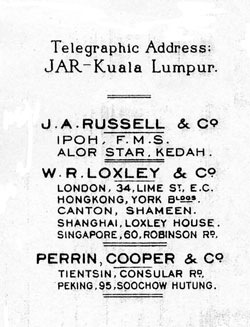
On 10 January Hong Guan’s civil case against Archie was put back till February. Also on the 10 January in K.L., Legge again asked for Archie to give Hong Guan $20,000, pointing out that through him Archie had made a considerable profit. Archie said he was not asking for the case to be withdrawn and the most he would give was $500 for passage money for him to start somewhere else.
On 11 January the Supreme Court resumed Mr. Peck’s case against Archie, when further arguments over whether Mr. Peck as a shareholder had a right to sue were made. For a whole day Mr. Peck’s counsel, Mr. Hastings cited many previous cases to show that when the directors of a company refused to take action a shareholder could sue. On the 12th another day was spent by Mr. Hastings arguing for his client’s right to take action. His Lordship Mr. Justice Farrer-Manby, reserved judgment until 23 January, when the papers reported the full text of his decision, in over 4,000 words, that the action had been dismissed, and that Mr. Peck could not bring his case as it was, but if he paid the costs to date and his plaint was amended within 21 days, it could be heard.

Appointments
In February Archie was appointed to a Government committee of 9 members to consider the future administration of the Port of Prai.
In April he was re elected as a director of the Kamasan Rubber Company.
In late February, in the Supreme Court Mr. E. D. Shearn acting for Archie asked for the right to appeal in the Peck case but was refused.
On 6 March Hong Guan had appeared in court in Singapore charged by Archie with criminal intimidation, by 13 March arrangements were made to try the case in Kuala Lumpur. Hong Guan was given bail, the chief detective inspector saying there was no risk since Hong Guan had been trying to get himself arrested for the last three weeks. On 15 March he surrendered himself at Kuala Lumpur and was given bail and the case was fixed for 9 April. It was later postponed till the 23rd.
Archie's case against Hong Guan.
On the afternoon of 30 April Archie’s case of intimidation against Hong Guan came to court, and was expected to last all week. Archie’s counsel Mr. Shearn outlined the series of meetings that Hong Guan and others had had with Archie. The case continued the next day, when Archie had to go into the witness box. He explained the whole series of meetings and letters from Hong Guan, Legge and Dr. Chee. Mr. Knowles then subjected him to what the Straits Times later described as a “severe cross examination” Mr. Knowles went through the legal correspondence between Archie and Hong Guan and the details of their various meetings including the original Pamoekan Bay deal. Mr. Shearn objected that this would affect the pending court case with Mr. Peck and that Mr. Peck was in the court, but was overruled. At the end of Archie’s cross examination the court was adjourned till 2.15 the following day when the paper’s reported a sensational termination of proceedings when Mr. Shearn decided that they do not have enough evidence to go any further with the prosecution and withdrew the case.
On 31 March the papers reported that Archie had crashed his Cadillac on the way back from a meeting of the Prai Docks Commission. He was unhurt but the car was a write off.
This was not the only case that Archie has been involved in as on 28 May the papers reported that he had been sued for $327.50 for damages over a motorcar collision in Syers Road.
Malayan Collieries 9 A.G.M.
On 27 April Archie chaired the ninth annual general meeting of Malayan Collieries. He described the labour troubles at Pamoekan Bay where work had resumed in March, praised his new manger Mr. James Barr, and described the progress at Pamoekan Bay.
Mr. Peck was present and tried to raise several issues but Archie ruled him out of order and the report and accounts were passed. Mr. Peck wrote to the papers to complain about their inaccurate reporting of his words at the meeting, they replied that their reporter’s shorthand was correct.
On 12, 13 and 14 June the Peck - Russell case was taken to the Appeal Court, where Mr. Peck’s solicitors argued that Mr. Justice Farrer-Manby’s decision was wrong
On 28 June Hong Guan, who had changed his mind about withdrawing his suit, decided to re start the plaint against Archie in the Supreme Court at Kuala Lumpur with new solicitors: Messrs. Freeman and Madge, of Kuala Lumpur and Messrs. Braddell Brothers of Singapore. David Freeman was at the time bringing up Ted Russell, Archie’s nephew.
Going Home
On 18 July Archie sailed on the steamer Malwa for a holiday to England. It appears that he had gone Home due to ill health. While he was there he met Mr. England, the ex General Manager of Malayan Collieries, whose son also worked for the firm.
On 19 August in the Trenagganu Supreme Court Hong Guan lost a case over an agreement he made in 1916 and was told to settle his debt within thirty days or his possessions would be sold by public auction.
Mr. Peck had appealed to be allowed to bring his case in the Kuala Lumpur Supreme Court against the decision of the lower court and the 3 justices allowed his appeal on 23 July. Their deliberations were reported in detail in the Straits Times of 24 July in over 3,000 words. Sir Lionel Woodwood, Chief Judicial Commissioner overturned the decision of Mr. Justice Farrer-Manby in the lower court, agreeing that Mr. Peck could bring his case and granted him costs.
Trouble at Pamoekan Bay.
In September the papers report that a murder had occurred at the Pamoekan Bay mine and that local police in maintaining order had killed six Chinese miners, and injured 14, and that all of the 600 Chinese labour force there were to be deported. Malayan Collieries shares slumped.
It is not until 26 October that J.A. Russell wrote to the paper to correct these facts, saying that only the 200 who had taken part in the disturbances had been deported, and had been replaced with “ natives of the Netherlands Indies” and that Dutch local officials had not disallowed importing fresh Chinese labour, and were being very helpful.
Failure to stop Mr. Peck.
In order to stop Mr. Peck, Archie’s solicitor applied to the Supreme Court on 9 August to have the case heard in Privy Council. The application was postponed until the next court of appeal. On 26 September the case was heard. Mr. Shearn argued that the case was of sufficient public importance to go to Privy Counsel. Mr. Braddell for Mr. Peck said this was “, a most vexatious application and quite unnecessary. It was well known that at the Chancery side in England litigation can be hung up for many years by continual interlocutory applications and appeals and further appeals and then more interlocutory applications. There were innumerable decisions which could be quoted to show that this particular order was beyond all dispute an interlocutory order. He submitted that to allow them to go to Privy Council would be a great injustice to the plaintiff as it would enable them to spend the plaintiff’s money uselessly because everything they wanted to go to Privy Council about was opened to them at the actual trail. The only possibility, said counsel in conclusion, why they wanted to go to Privy Council was to keep Mr. Russell out of the witness box and to use up the plaintiff’s money. It was well known that Mr. Peck was acting on subscriptions from shareholders and the amount was nothing like the wealth at the disposal of Mr. Russell.” The three justices agreed with him and the application was not allowed.
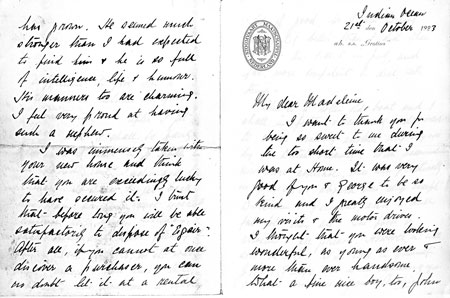
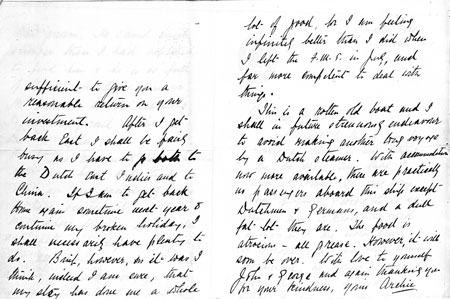

On 16 November the report of the Federal Council mentions the work Archie has been involved in with the Prai Docks commission.
The 14 December papers reported “the return of Mr. H. H. Robbins, representative of Messrs. J. A. Russell and Co., of Kuala Lumpur, returned to Kurching on his way back to Miri on November 27. The Sarawak Gazette understands he did not find any traces of oil there, though he appeared keenly interested in the geological formations of the area.”
On 18 December it was reported that Archie’s request to the Supreme Court for a commission to Java to interview Dr. William Birnie, Mr. Tan Way An and Mr. Jan van Ryswyk and some others for the Peck case was granted.
Archie arrived back in K.L. on 1 November. A day later on 2 November Hong Guan brought his case against Archie in the Kuala Lumpur Supreme Court. Mr. L. H. Cowdy and Mr. Shearn appeared for Archie arguing on technical points that the case could not be brought again after it was withdrawn. Mr. Knowles and David Freeman represented Hong Guan. Mr. Peck was also in the court. His Lordship decided against Archie and agreed that Hong Guan should be allowed another action.
At this time Edward Russell lived with Mr. & Mrs. David Freeman, as his foster parents. The Freemans had made it a principle to either adopt children whose parents wished to disown them, or to send them to “Barnardos” in England. Ted was told that David Freeman had approached Archie to adopt him and that Archie had refused but agreed to pay for Ted’s education. Archie paid Ted’s school fees at the St. John Institution, located at Bukit Nanas. When the Freemans went to England on leave, Archie wrote to the Principal of the school that his brother, George Russell, had denied he was Ted’s father, and wanted Ted’s name changed otherwise he would stop the payment of the school fees. The brothers at St. John’s wanted Ted to stay on so he picked the name “Davidson” from a number of names that had been written on pieces of paper by the brothers. On their return from leave Ma Freeman asked why Ted did had not taken the name of Freeman. The record of the name change at St Johns was January 1924.
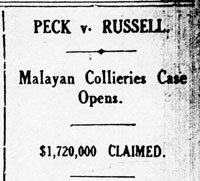
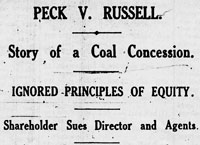
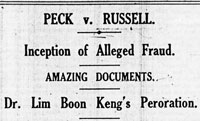
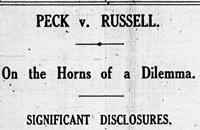
Week 4, days 16-20.
On Monday April 7, week 4 of the case commenced. Archie’s evidence covered the sale of the option to Malayan Collieries and an explanation about the alteration of Malayan Collieries financial year, which was not done to conceal the transaction. After two and half days in the witness box the cross examination by Mr. Braddell began. Archie said that the purchase and sale of Pamoekan Bay was an honest transaction. Mr. Braddell asked him why if it was an honest transaction he concealed the profit that he made from the sale of the mine to Malayan Collieries. Archie explained that the shareholders did not need to know his profit and that in speculating it was “the whole of his business” to keep things quiet. He answered Mr. Braddell’s questions very precisely and Mr. Braddell said he was fencing with him. Mr Braddell went through various documents in which he felt Archie had not been honest. He questioned him on Mr. Hastings the employee of J. A. Russell and Co. going on the Borneo expedition. He asked if Archie was familiar with the Companies Enactment and Archie replied that he wasn’t. Mr. Braddell expressed surprise that he was being paid $2,000 a year in fees from Malayan Collieries as a director and his firm is enjoying the sum of $2,500 a month from Malayan Collieries and other companies and that he had floated a number of companies and he had never read the Companies Enactment. He questioned him on the fictitious names he had used as his nominees. He was questioned on whether he ever really meant to keep Pamoekan Bay for himself. Mr. Braddell suggests that this would have broken Malayan Collieries. Archie was emphatic that this would not have been the case. Mr Braddel was keen to emphasise that Archie had made a secret of his profits from the shareholders. Yes agreed Archie, they were not told. Mr. Braddell asks him if he thinks that is honest. Archie replied that it was no business of theirs what profit he made. On Tuesday 8 April, the cross examination continued with questions of the Borneo expedition, the sale of the mine from E.M. & R. Co, and the sale of the mine to Malayan Collieries. Then Mr. Hastings was called to give evidence, and described the expedition to Pamoekan Bay. His evidence was followed by Archie’s fellow directors of Malayan Collieries: Mr. Hengeller and Mr. Grant Mackie. On Friday 11 April Ho Man was called. He was the open cast contractor for Malayan Collieries and had been prepared to go into partnership with Archie over Pamoekan Bay if Malayan Collieries had turned it down. Mr Robinson, solicitor, and member of the firm of Messrs. Drew and Napier, was questioned. His firm were solicitors for M.C. He had drawn up the transfer of shares into the names of nominees, and the transaction between the E.M.R. Co. and J. A. Russell and Co. He was the last witness for the defence. Mr. Carver then summed up the defence, arguing that it was quite clear that Russell and Co. had acquired this option for themselves. He argued that because J. A. Russell and Co. were not whole time employees of Malayan Collieries they were allowed to carry on business of their own and did not owe a duty to Malayan Collieries to refrain from buying options themselves. He said that Mr. Russell did not control a majority of the shares, and that he did not use his connection with Malayan Collieries to help secure the option. Mr. Braddell then began his summing for the plaintiff.
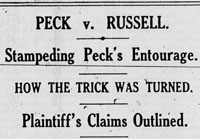
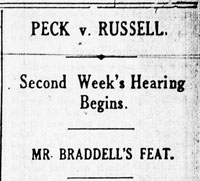
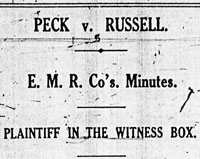
Week 5, days 21 and 22.
On Monday 14 April Mr. Baddell spent the whole day summing up and the case concluded on the 15th. Mr. Braddell claimed that Mr. Carver had ignored the evidence and that every day there had been more evidence of dishonesty by Mr. Russell. He claimed that it might be that Mr. Russell is “one of those persons incapable of any differentiation between truth and lies” or he had been deliberately dishonest. “ To say that he is a European with a Chinese mind would be unfair to the Chinese”. Shareholders had been cheated out of one and half million dollars. Russell had deliberately defrauded Malayan Collieries, and forged proxy documents. At the end of his address it was agreed that solicitors should hold the 51,500 shares in Malayan Collieries that had been put into the names of nominees until the judgment was made. The judge reserved his judgment and thanked counsel on both sides. The Malay Mail remarked that the trial would go down in history as one of the most remarkable and that the measure of public interest could be gauged by the tremendous demand for copies of the Malay Mail, the only paper to attempt a full report of the case.
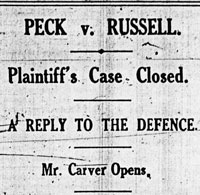
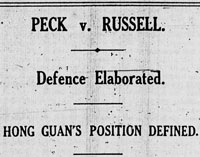
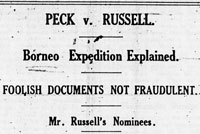
Week 3, Days 11-15.
On Monday 31 March, after Mr. Upcott had completed his legal points, arguing that Archie had disclosed his interest to the Directors, the written evidence from Dr. Lim Boon Keng was read. Mr. Peck, and Mr, Shearn had examined him on Dec. 20, 1923, before Judge Meyrick Hewlett at his Majesty’s Provincial Court at Amoy. In 1920 he was the chairman of the Eastern Mining and Rubber Company Ltd. At the time that they were buying Pomoekan Bay, they could not raise the money and needed to sell to somebody who would take over the purchase in order not to lose the contract. He explained that it was not a free option and that he was dealing with J. A Russell. He went through the details of the sale of the colliery to E.M.& R. Co. saying he had left the details to Mr. Poey the managing director, not suspecting any fraud. His evidence was continued on day 12, Tuesday 1 April. Then Mr. Carver read Mr. England’s evidence. Mr. England was the general manager of Malayan Collieries in 1920; his evidence had been taken on commission in London. He described his visit to Pamoekan Bay, insisting that it was his own decision to ignore Archie’s instructions to go to Seboekoe on behalf of Malayan Collieries. Then the evidence of Mr. van Ryswyck, the administrator of Pamoekan Bay and Dr. Birnie a director of the Eastern Mining and Rubber Co and the Dutch vendor Company was also read. By Wednesday 2 April, day 13 of the proceedings, the morning continued with the reading through of evidence from Dr. Birnie and also the evidence of Mr. Tan Way An, the agent of the Eastern Mining and Rubber Co. In the afternoon Archie was put in the witness box and began his evidence. He described his businesses in Malaya, and how he floated Malayan Collieries. Mr. Carver examined him and asked what the duties of J. A. Russell and Co. as Agents were for Malayan Collieries to which Archie replied: the sale of coal and the purchase of mine supplies. At no time did Malayan Collieries say it was his duty to search for new coalmines and at the same time they did not wish him to stop his speculation activities. In 1918 he had set up China Minerals to look for coal in China but despite spending $30,000 they had not found any. If he had he would have made a profit out of it. He then began to answer questions about his dealings with Hong Guan in 1918 and how he came to owe J. A. Russell money, and their dealings over the Pamoekan Bay option. On 3 April, day 14, Archie’s evidence on buying the option from Hong Guan continued. Archie thought it was not a free option, and described how he negotiated the terms. He said that he had always acted as J. A. Russell and Co. On 4 April, day 15, Archie was in the witness box for the third day describing how he paid the deposit for the option, his dealings with Hong Guan over the revised option of October 3 and the deposit of the $60,000 in the bank. He was cross-examined about the expenses for the Borneo expedition by Mr. Braddell. He described the expedition, and Mr. England’s failure to go on to Seboekoe, the good reports of the mine, and his arrangements with Hong Guan to put their shares in the names of nominees. The hearing was adjourned till the following Monday with about another hour left of Archie’s evidence.
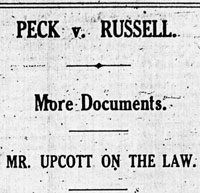
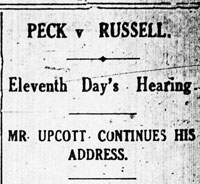
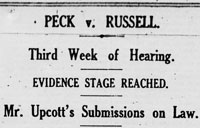
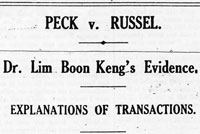
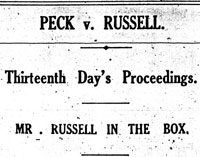
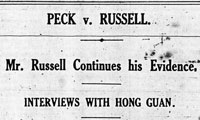
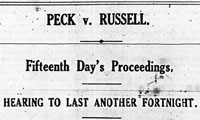
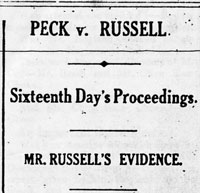
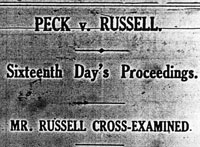
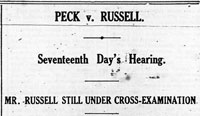
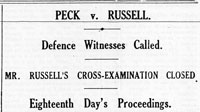
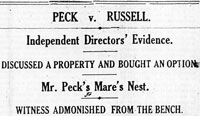
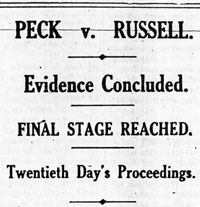
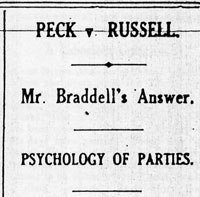
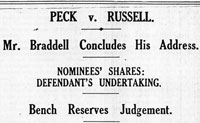
Malayan Collieries 10th A.G.M.
The tenth A.G.M. was held while still waiting for the Peck v. Russell verdict to be announced. Archie was in the chair, and Mr. Peck and his supporters were present. Archie went through the report and accounts. There had been difficulties at Pamoekan Bay, when during a visit by one of Malayan Collieries’ directors there was a riot and since then all the skilled Chinese miners were repatriated, so that new Javanese and Chinese miners had to be trained. He had been disappointed with the Javanese and said there would be little improvement until several hundred Chinese were working the mine. European Staff at the mine had been changed. He put the report and accounts to the vote but Mr. Peck suggested an adjournment until after the judgment of the case. He asked why there was no longer an item called “general “ on the agenda. Archie replied: “The item was left out deliberately because the company had been called for these particular purposes and not to give a chance to Mr. Peck for a little propaganda.” The accounts and report were then passed. Mr. Peck attempted to block the re election of Archie and Mr. Hampshire as directors, particularly since Mr. Hampshire had that morning supported Archie’s re election as a director of Utan Simpan. He was outvoted.
When the court case that Hong Guan took out against Archie came up for hearing on 4 March, it was postponed until after Mr. Peck’s case.
PECK V RUSSELL
The case began on March 17th and lasted for 22 days. The newspapers reported that the Peck v. Russell case was the most important in the Malayan courts for many years because it questioned companies’ use of Managing Agents, and involved such a large sum of money. It would also be the largest ever heard with enormous volumes of files, minutes, correspondence and evidence. Mr. Peck was suing Archie for $1,720,000 damages that he alleged Archie had fraudulently made out of his sale of the Pamoekan Bay coal mine to Malayan Collieries. For the whole of the first 4 days of the trial from the 17- 20 of March, Mr. Braddell, the lawyer for Mr. Peck, outlined the charges: that Archie had not bought the mine for J. A. Russell and Co., that he had not disclosed the true facts to Malayan Collieries when he sold it to them, and that as a director of Malayan Collieries and agent of Malayan Collieries he was in breach of his duties, that the Company had refused to take action because Archie controlled the majority of the votes, and that he had kept his profit of 80,000 shares a secret. It is clear that Mr. Braddell is seeing this as a test case for rules over the protection of capital and investments in Malaya by investors all over the world. In England companies had their own staff but in Malaya nearly all firms were run by firms of agents: “this was not merely a case of a director of a company who had sold his property to the company. It was a case brought against the company’s managing agents, whose managing director was also chairman of the company.” The fifth day, 21 March, was taken up by Mr. Braddell with the legal side of the case. The Malay Mail, which reported the trial verbatim commented on his lucidity, eloquence and logic and said it was a remarkable feat of physical endurance.
The Judgment and Costs.
The judgment in the Peck v. Russell case was given on 15 May. It was very lengthy covering 60 pages. Mr. Justice Whitley found that Mr. Peck had not proved the allegation that Archie acted for Malayan Collieries and then committed fraud by selling it to the Company. He found that Mr. Peck had not proved that Archie used the authority of Malayan Collieries with Hong Guan to enable him to get the option. He found that the evidence of Mr. England and Mr. Hastings proved that J. A. Russell did divert the Seboekoe expedition to their own interest and that in effect the one property was substituted for the other and this was done at the sole cost of the Company. He found that the acquiring of the option was within the scope of J. A. Russell, and Co. but that they were under a duty to refrain from acquiring the option for themselves. It therefore followed that they must be deemed to have acquired it as agents for the Company and to have held it as trustees of the Company. He found that Archie did make the disclosure necessary when he sold the mine to Malayan Collieries.
The headline “Who Wins?” was run by the Singapore Free Press and Mercantile Advertiser of 17 May and the Malayan Saturday Evening Post of 24 May noted that even trained lawyers were mystified. In June the lawyers began to argue about costs. Mr. Justice Whitley’s finding were that the defendants were defaulting trustees meaning that the whole of the 80,000 shares had to be paid back to the Company. Due to the amount of speculation in Malayan Collieries shares caused by the trial, deciding what they were worth proved difficult. The courts findings regarding compensation were delivered on 5 June. It was declared “that the company is entitled to the return by the first and second defendants jointly and severally of 76,667 shares of the company.” Archie had fourteen days to pay this and the costs, unless he put in an appeal.
On 7 June Mr. Still wrote one of his editorials in the Straits Times; entitled “Commercial Morality in Malaya” “Here we have a firm of managing agents making gigantic profits out of a sale by them to the Company whose business they are paid to manage; we have their senior partner in the position also of chairman of directors of the company and in the possession of what, for all practical purposes, was a controlling interest in the Company…. Is the Companies Enactment of the Federated Malay States the mere tool of rich men, to be broken at their pleasure? Are leading men in Malaya careless with whom they sit on the boards of public companies? Is the almighty dollar the only measure of our conscience? Have our law officers and registrars not got the powers to stop such things? Or, if they have, are they afraid to use them?” He called for the shareholders to remove Archie as a director.
On 25 June Archie’s solicitors lodged an appeal, and on the 4 July after surrendering 61,162 shares and $785,865,26 in cash to Malayan Collieries, (equivalent to a total of about two million dollars) Archie was reported to have sailed for England.
Malayan Collieries sent their shareholders a circular in August calling an extraordinary general meeting of the company, to thank Mr. Peck, pay all his costs involved in the suit and approve a sum of money to go to him by way of appreciation.
Losing Control of the Company.
Mr. Henggeler later reported that on 30 September at a Malayan Collieries board meeting, the directors decided that in the light of the facts revealed in the Peck v. Russell case, the management of the company should be taken out of the hands of J.A. Russell and Co. At a meeting between Archie and the independent directors Archie was informed by Mr. Henggeler in the presence of the other directors of the decision. The directors had decided to appoint a full time managing director instead.
The Russells’ fight back.
Archie and Bob using their shares and the shares previously owned by Phil and now owned by his widow Hilda, requisitioned an extraordinary general meeting of Malayan Collieries proposing that no changes be made without reference to the shareholders. The meeting was fixed for 18 October.
“RUSSELL REDIVIVUS’ was the headline in Singapore Press and Free Advertiser of 6 October. They commented “Mr. Russell, having mobilized a new army, has struck suddenly at a vital spot and the company directors have been forced to bring out again all their heavy and light artillery in preparation for another great battle. Whoever wins it will give us all an enthralling topic of conversation for the next few months and we shall be able to drop rubber restriction for a time!” The Malayan Saturday Post said “… the house of Russell is not surrendering without a further struggle, and the resolutions to be submitted to a meeting requisitioned for next Saturday are likely to produce a battle royal, in which it may be taken for granted that Frederick Charles Peck will be a formidable belligerent…. next week’s meeting is going to be absorbingly interesting, and it may be hoped that the press will be admitted, in the public interest generally, and in the special interest of shareholders unable to be present.”
Hong Guan
In November Hong Guan’s bankruptcy case came to court and further allegations were made against Archie. Hong Guan said that Archie had made a verbal agreement with him to give him a third of the profit from the Pamoekan Bay mine, and that he cheated him out of it. The case revealed the large number of business failures that Hong Guan had been involved in. Hong Guan said that he had been hoping to get money out of the Peck Russell case. His own case against Archie had cost him twelve thousand dollars and it had never reached a judgment stage. The Singapore Judge, Mr. Justice Barrett Leonard, had not heard of the Peck - Russell case. It was explained to him. He commented to Hong Guan that if he knew that Archie was an agent of the Company and was buying the option to sell to the Company, then Hong Guan should have known that he was involved in illegal activity. Hong Guan said he was now working with the object of paying off his debts of $150,000 in full with the help of his friends. It is not known what happened to Hong Guan after this. Another notice of bankruptcy in August 1932 for a Ng Hong Guan of 4 Koek Road, Singapore has been found.
Mr. Still wrote another leader article on 17 October commenting that: Dr. Birnie seems to have used his very considerable influence with the Board of the Eastern Mining and Rubber company to procure a decision from the Board in favour of Messrs J. A. Russell and Co. as Managing Agents of Malayan Collieries. He added: “ We would regard it as almost indecent to restore Messrs. Russell until final judgment is given in the case. As the judgment stands at present Mr. J. A. Russell in seeking his own interests failed in his duty to the company, and is required to make good to the company the loss which that failure involved. Surely it is obvious that as long as the judgment stands, his reappointment as chairman, and the appointment of his firm as agents would be a condonation of most grievous irregularity.”
The Malayan Collieries extraordinary general meeting requisitioned by the Russells and the E.M. and R. Co. took place on 18 October. At a very crowded meeting Bob Russell moved the resolution that the directors must consult the shareholders before taking the action to remove J. A. Russell and Co. as managing agents. Archie was not present at the meeting. Mr. Peck wanted to make several points. He said he (Mr. Peck) might reply that under the management of Russell and Co. Malayan Matches had been brought to a state of adversity, and its shareholders were in danger of losing the whole of their capital. Mr. Peck referred to a circular signed by Russell and Co., and issued in 1920, dealing with Pamoekan Bay and pointed out that that mine had not yet paid its way nor had the dividends been increased. "He submitted that Russell and Co. had not shown any conspicuous ability, and that that was shown by the evidence in the lawsuit. The company had been as successful as it had been in recent years in spite of Russell and Co., not because of them, and in view of the fact that the whole of the independent directors, including the new and absolutely unbiased director Mr. Egmont Hake, were unanimous in their attitude in this matter, he thought the shareholders ought to conclude that Russell and Co. were by no means indispensable, especially in view of the revelations of the recent law suit, and of the revelations he could make if he was allowed. He submitted that the vote for the resolution almost amounted to voting for fraud.” He was applauded. The resolution was put to the meeting and lost. So the resignation of Messrs. J. A. Russell and Co., Managing Agent Company, and of Mr. J. A. Russell, managing director, and also the decision of the independent directors to accept these resignations, remained in force.
Under the heading: “The Russell Coup Fails” The Malayan Saturday Post commented:” The requistionists required 126,315 votes on the poll to win the day, and they secured 125,431- only 884 short on such a large total. And be it remembered that a substantial part of that vote represents Mr. J. A. Russell and Messrs. Russell and Co., the person and the company chiefly concerned in the matter – a case of the accused sitting on and almost swaying the verdict of the jury at his own trial, as it were. That is a ridiculous position however strictly it may be justified from the mere technical or legal standpoint …. The fact that such a motion was ever contemplated exposes the whole purpose of the requisitionists – namely, to use their voting power to retain in office as managing agents a gentleman and a firm who are no longer acceptable to a large majority of shareholders other than themselves. It is to be hoped that there is enough commercial decency left among business men concerned to save the shareholders any further attempts of such a nature as that just frustrated.”
On 30 October another extraordinary meeting of Malayan Collieries was held to consider Mr. Peck’s expenses and compensation. The first resolution agreed to pay all his costs, in the past and future and this was carried unanimously. The second was the question of the amount of remuneration, which caused a long discussion, with Bob Russell disagreeing with the resolution being put at all. The resolution to pay Mr. Peck 5% of what he had recovered for the company, an amount of about $100.000, was carried on a show of hands and Bob then demanded a poll. On the votes being counted the resolution was lost. The meeting was then postponed until after the hearing of the appeal. The Malayan Saturday Post, of 1 November called the issue the “Malayan Collieries Comedy” and wondered how many more acts there would be, suggesting that the audience was beginning to yawn and wish the play was at an end.
Malayan Collieries declared a second interim dividend of 7 ½% in early December. On 18 December a circular was issued to the shareholders informing them that: “ The Board of Directors have arranged that from January 1, 1925, the general management of the business of the company will, subject to the control of the board, be undertaken by Mr. James Barr, B.E., the present General Manager. Mr. Barr’s powers of management are being increased, while Mr. H.D. Brown remains the Company’s Secretary. The board have also arranged that the office of the Company will be transferred to Laidlaw Buildings, Java-st., Kuala Lumpur, as from January 24.
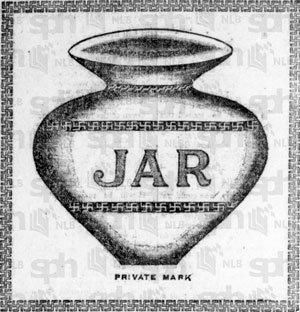


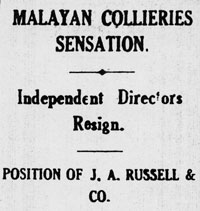
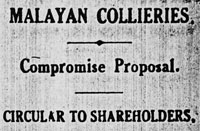
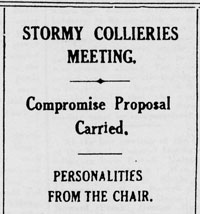
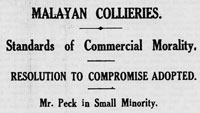
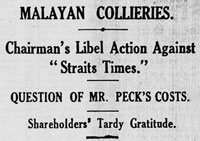
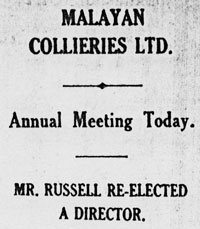
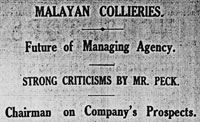
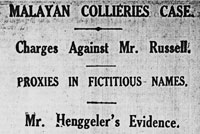
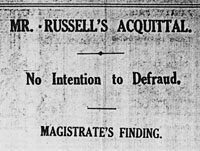
“MALAYAN COLLIERIES SENSATION”
At the beginning of 1925 Archie had not only lost his court case, and all the profits from the Pamoekan Bay deal, but his firm ”J. A. Russell & Co.” had been removed as the Agents and Secretaries of Malayan Collieries. However he was still a director and a large shareholder. He arrived back in Singapore on 3 January having left London on 5 December. Investigations into the shareholder’s vote of 18 October were begun, and it was discovered that some votes had been miscast and the decision of the meeting should to be reversed. The other directors were informed of this and took legal advice. All four “being of the opinion that it is not in the best interests of the company that the services of Messrs. J. A. Russell and Co., be retained,” they resigned. On 14 January a Collieries circular advised shareholders that Messrs. Henggeler, Hampshire, Egmont Hake and Chew Kam Chuan had tendered their resignations as directors, leaving Archie as the only director of the company with the power to fill the vacancies. On 15 January the papers announced: “MALAYAN COLLIERIES SENSATION” and revealed the details.
The new result caused strong responses from Mr. Peck and Mr. Still. Fred Peck wrote to the Straits Times and the Singapore Free Press three days later, very critical of the director’s actions: “they act in such a way as …will give Mr. Russell the opportunity of ensuring not only that those services shall be retained (or re-acquired) but also that they shall be retained or given without any control by directors other than Mr. Russell’s own nominees!” Archie had appointed Mr. Ferrers the largest single shareholder as a director. Mr. Peck argued that the old directors had a moral duty to stay: and that Archie’s return would be “a moral catastrophe.”
Mr. Still wrote another of his leaders in the Straits Times: “it is grossly wrong to allow Mr. J. A. Russell to sit upon the board or to have his firm in any way actively concerned in the affairs of Malayan Collieries, and anyone who gives votes in favour of Mr. J. A. Russell or his firm is condoning the dishonesty which the judge so clearly emphasised…. Pending the appeal it is morally wrong to allow Mr. Russell to obtain a seat on the Board. No man with a high sense of honour would vote for him; if his own sense of honour was acute, he would have refused to take advantage of his voting powers until he had cleared his character from the aspersions cast upon it by the judge after a long and most careful trail of the issues. But he does not take that view. We are not the keeper of his conscience, but we are in a sense a keeper of the public conscience on matters of commercial morality, and if the fundamental principals thereof are being over looked we feel it is our duty to state them. If Mr. Russell can clear his reputation we shall be glad to offer him our congratulation. Until he does, there ought to be no place for him on the Board of any public company here or elsewhere.” The Malayan Saturday Post commented that now Malayan Collieries was a tragi- comedy, and though it may entertain readers of the press, the public were now tired and shareholders disgusted: “The company’s business is to win and sell coal- not to keep judges busy and help a pack of lawyers to premature retirement.” The Malay Mail on the other hand was more conciliatory in its leading article commenting: “ everybody knows’' that an “entirely honest and admirable attempt” has been made to carry on the business of the company “in the best interests of the shareholders”.
Mr. Peck disagreed with the Malay Mail's view of the resigning directors and wrote another very long letter published on 28 January, saying:” I myself had never had confidence in them; and I doubt whether some of them have had as great a desire to serve the best interests of the company and to prevent Mr. Russell’s control as they have had to dish me; for I have not attempted to hide my lack of confidence in them.” Mr. Peck wrote another letter to the Malay Mail on the 30 January comparing the directors who resigned to soldiers leaving the enemy (i.e. Archie) in the strongest position with his heavy guns. He also attacked the Malay Mail saying: “This brings me to the my final point in reply, - the question of your own responsibility for this “dramatic incident”. I am quite unable to agree with your suggestion that there is something meritorious in having refrained from editorial comment on any Malayan Collieries affairs for more than two and half years after my original disclosures. Perhaps that “dramatic incident” would never have occurred had you, on due occasion, given publicity to a little “forcible comment”. As, however, it is now clear that you are openly on the side of “common decency", I will say no more, but reserve my “forcible comment” for those who have been shamelessly and shamefully on the other side.”
The Malayan Saturday Post commented on Mr. Peck's letter which they felt may be libellous and urged him on to more action, writing: “So what’s the next bright idea, “Pecky” boy?” Mr. Peck’s responded on 3 February writing again to the Straits Times arguing that the resigning directors not only had a duty to disregard the resolution of October but that under the Companies Act they had a legal duty to disregard it.
In early February Malayan Collieries issued a circular explaining that the Board had been reconstituted and the directors were Mr. H.N. Ferrers (Chairman), Mr. F. Cunningham, Mr. J. Barr and Mr. J. A. Russell. They proposed a compromise, which they would put to shareholders. It consisted of the Company giving up 8% of what Archie had returned to them if Archie gave up appealing against the judgment, (which would save Malayan Collieries a lot of money in future legal cases), and Archie would be indemnified against any more actions by Mr. Peck.
Mr. Peck wrote to the Straits Times telling shareholders not to vote for this resolution. An Extraordinary General Meeting was called for 20 February. The Malayan Saturday Post humorous column commented on the continuing drama:” The “heavy” role is being perseveringly played by J.A.R. and the “hero”, to wit F.C.P. is pondering his next “lines”… Whether tragedy or comedy depends upon the point of view.”
Mr. Peck’s opinion was that the compromise was illegal. An original shareholder wrote to the press arguing that the litigation should stop and pointing out: "that only a man of Mr. Russell’s outstanding ability could have given the returns to shareholders on capital invested that Malayan Collieries have done in the past”.
“Stormy Collieries Meeting” was the headline of the report of the meeting on 20 February. Mr. Ferrers chaired the meeting, which was held in a room decorated with photographs of Batu Arang. He told the meeting that the board wished to retain the services of J. A. Russell and Co. in a consultative capacity. When the compromise resolution was put Mr. Peck, put up a strenuous opposition. He said: “He (Mr. Peck) had obtained the judgment against the opposition of the company, and they had no right to deprive him (Mr. Peck) of the moral satisfaction of attaining the object of litigation- the establishment of a higher standard of commercial morality in this country.” Mr. Ferrers lost his temper with Mr. Peck and finally said:” We have in Mr. Russell a gentleman who has built up a magnificent industrial achievement, and who has created a property of which anyone might be proud…Against that you have a fellow like Peck, who has never done a decent stroke of work in his life, who spends his time in a back room of an insignificant Singapore Hotel trying to get up more litigation, and he comes up here and talks about commercial morality. This is the pride of Singapore and the pet of Still, who comes and lectures us on commercial morality.” Mr. Ferrers had tried to negotiate a compromise with Mr. Peck but he had refused, even though strongly advised by Mr. Braddell and his solicitors to accept. As far as Mr. Ferrers was concerned “his opinion was that Mr. Peck’s victory was one on a pure technicality, and he took the view that the action was misconceived. He regretted that in the heat of the moment he might have seemed unmindful of the fact that he profited to a considerable degree by this action, but the whole of Mr. Peck’s speech seemed to be conceived in a spirit of hostility to Mr. Russell, rather than of friendship to the company.” Parts of his speech were omitted in the news reports for fear of legal consequences. The compromise proposal was passed, and Archie withdrew his appeal in the Peck vs. Russell case.
Mr. Ferrers realised he had gone too far and apologised to Mr. Braddell, a fellow lawyer, who accepted his apology. But Mr. Still was prompted to write another very strong leader article in the Straits Times. In it he attacked Mr. Ferrers’ character, calling him Archie’s henchman, calling Archie a fraud, dishonest and only interested in private gain and added: “If we had ever made a speech that fell from the lips of Mr. Ferrers we should want to whip ourselves with scorpions and to hide from the faces of honourable men.”
The Singapore Press noted that they have not been partisan about the Malayan Colliery’s case, but that Mr. Peck whether right or wrong behaved better than Mr. Ferrers. The Malayan Saturday Post said:” in our opinion, Mr. H. N. Ferrers, by his foolish, unnecessary, and provocative remarks at last weeks meeting, has inaugurated his chairmanship of Malayan Collieries, Ltd. very in auspiciously, and rendered poor service- even a very distinct disservice- to the shareholders and to his friend Mr. Russell.”
Malayan Collieries issued a circular to shareholders explaining that the compromise resolution having been passed, Mr. Russell had withdrawn his appeal. Since Mr. Peck had threatened further litigation they asked shareholders to rescind the resolution that was passed agreeing to pay all Mr. Peck’s past and future costs.
Mr. Peck wrote another letter on 26 February explaining that after consulting legal advisors he was not proceeding with his cross appeal. But due to the company’s compromise being passed he had instructed his solicitors to institute fresh proceedings to test its validity.
On 7 March at another Extraordinary General Meeting, Mr. Ferrers as chairman told the shareholders present that he was taking proceedings against the Straits Times for libel. Mr. Peck was present at the meeting and asked about his legal costs being paid. Mr. Ivens the company’s solicitor said the costs would be paid if Mr. Peck gave an undertaking to refund the money from his supporters. Mr. Peck said this was an attempt to embarrass him financially and was unjustified. Mr. Ferrers replied that the company had sent a cheque to Mr. Peck for $30,000 but that Mr. Peck had refused to take anything from the present board, and insisted on further legal action. The resolution to pay all Mr. Peck’s costs in the future was rescinded. The resolution to pay all his past costs was passed. The newspapers looked forward to the Ferrers vs. Still case. But by 30 May it had been "privately settled".
An article in1934 explains how. See left.
The ongoing litigation did not affect the Collieries dealings with the F.M.S. Electricity Board which renewed its contract for coal to be supplied to the power station for one year, nor did it affect Archie's other directorships. He was re elected as a director at New Serandah's 15th A.G.M. and as a director of the the Collieries at its A.G.M in May, despite Mr. Peck's objections.
A.G.M.
Mr. Ferrers presided over the meeting. He had visited Pamoekan Bay. There had been a flood at Batu Arang. There was talk of a hydroelectric scheme and Mr. Ferrers was keen to give figures that showed that power stations run on Batu Arang coal were economical. He announced that J. A. Russell and Co. remained as Managing Agents, a position which, with the exception of 16 days in January, they had occupied since the beginning of the Company. Mr. Peck objected very strongly to this. He questioned the legality of the compromise voting, he objected to the company keeping some information from shareholders, he objected to the directors, he said the company was a disgrace to the whole country, he said Archie had committed fraud, he wanted the referees report circulated and so on. Mr. Ferrers let him carry on without any interruption and then asked if there were any questions on the report and accounts. Mr. Ferrers proposed Archie as a director which was seconded by Mr. Cunningham. Mr. Peck and Mr. Walker tried to postpone the vote. This was defeated. The vote was taken and Archie was elected by a show of hands and by a poll of 55,411 votes for 1,263 votes, against. Mr. Ferrers was re elected. There was discussion on raising some remuneration for Mr. Peck from shareholders, since he would not accept it from the company.
However Archie had to face another legal case in May.
Another Court Case.
On 11 May, it was announced that criminal charges were to be brought against Archie by the Public Prosecutor for his alleged use of fictitious proxies. “ “Profound sensation caused,” said the Straits Times. ”An early arrival at the court was Mr. Peck who sat next to the D.P.P. and “occasionally the two held short consultations.” Archie pleaded not guilty and admitted using the proxies. He handed in a statement to the court: “ I admit that I used the seven proxies in question for voting at general meetings of Malayan Collieries, Ltd., held on 16 August and 21 November, 1922. The shares represented by the proxies all in fact belonged to me at the time I used the proxies and such shares stood in fictitious names. I consider and still consider that the shares belonged to me, so did the voting rights in respect of the shares, and that I was fully justified in fact and in law in using those proxies, although at the time I knew they were subscribed to in the fictitious names in which the shares stood.”
There were 300 pages of records and exhibits for this new case. Since Archie had admitted to the facts the whole case hinged on arguments in law. The facts of the purchase of Pamoekan Bay and the Peck vs. Russell case were gone through with the judge’s findings. Mr. Henggeler was called as a witness, to say that these proxies for Archie’s shares were used to vote at two meetings of Malayan Collieries. It was revealed that Archie voluntarily spoke about these in the Peck vs. Russell case. On 18 May the hearing continued with the evidence of Mr. Brown and Mr. Peck. Mr. Peck was keen to go into great detail but was told they are not going to try the Peck vs. Russell case all over again. He was questioned about the case but Archie’s solicitor Mr. Carver objected to him repeating anything from memory. Mr. Peck then used the shorthand notes that he took during the case. Mr. Carver insisted that these were read out, he then compared them to the judge’s notes from the case. Mr. Peck claimed that these notes were made by Pooley and Co. implying they were inaccurate. The chief clerk of the Supreme Court was recalled in regards to the notes taken during the case. On 19 May after a two-hour address to the court from Mr. Carver, the Magistrate gave his judgment and acquitted Archie, saying he had no guilty intention when using the proxies. He said that if Mr. Justice Whitley had been convinced that Archie had committed forgery he would have referred it to the D.P.P. himself, and that under the legal definition the essence of forgery was to have intent to defraud and that there was no guilty intention in this case.
Further Legal proceedings and arguments.
The Eastern Mining and Rubber Co. sued Mr. Peck to get the money back that they gave him for the Peck vs. Russell case. They had originally supported him and then withdrawn their support but he had not returned the money. Mr. Peck won this action. After the case was over he wrote to the Straits Times saying that the Eastern Mining and Rubber Co. had made the claim soon after Archie had become a director in order to hinder Mr. Peck’s action against him.
Pooley and Co. having claimed that their copies of court papers were accurate in a letter to the Straits Times, Mr. Peck wrote another letter listing their errors. On 28 May Mr. Brown on behalf of Malayan Collieries sent a circular to the Collieries shareholders about Mr. Peck’s accusations that 8,000 votes were illegally cast in the vote to retain the services of J. A. Russell and Co. last October. It said that this objection was a legally unsound technicality. The proxies case had been dismissed. It referred to Mr. Justice Whitley’s findings in the Peck vs. Russell case and said:
” It may be of interest, in view of Mr. Peck’s repetition of his allegations to the effect that Mr. Justice Whitley judgment contained a finding of fraud against Mr. Russell, to observe that, it was throughout the recent proceedings admitted that no such finding had been made by Mr. Justice Whitley. Moreover, after a perusal of the judgment it is apparent that Mr. Peck failed in each one of his allegations of fraud and that the issues which raised the question were decided against him. Mr. Peck stated that the transaction in reference to Goenoeng Batoe Besar put through by Mr. Russell was held by Mr. Justice Whitley to be per se of a fraudulent character. It is admitted that the expression re-iterated by Mr. Peck does appear in Mr. Justice Whitley’s judgment towards the end of it after he had decided against all those issues which raised the question of fraud; but it is used as part of Mr. Justice Whitley’s judgment where the learned Judge is dealing with quite another matter, and a reference to the judgment itself clearly shows that the expression does not bear the meaning attached to it by Mr. Peck. There is no question of Mr. Russell having secretly taken anything to which he knew he was not entitled. The shares he got were allotted by the board. There was no suggestion of any conspiracy between Mr. Russell and the board and the true effect of the judgment is that the board in honest mistake of their legal rights purchased the Goenoeng Batoe Besar property from Mr. Russell, and Mr. Russell in honest mistake of his legal rights sold the property to the company, whereas the court having held Mr. Russell to be the company’s agent in the matter of the acquisition of Goenoeng Batoe Besar he was also held to be under obligation to transfer the property at cost.”
Mr. Peck once again used the Straits Times to respond on 4 June, saying that if the case had gone against him he would not have succeeded in getting the equivalent of two million dollars returned to Malayan Collieries, and going through the judge’s statement in detail. Mr. Brown replied for the Collieries in a letter on 8 June. Mr. Peck responded on the same day. At which point even the Straits Times had had enough of legal points and said that the correspondence was now closed.
On June 26 the D.P.P. appealed against the judgment of the magistrate that had found Archie not guilty in the proxies case. The court of appeal met on 21st, and on the following day four judges dismissed the appeal. The written judgment was reproduced in the papers of 2 September “even assuming that the proxies were false documents within the meaning of Sec.464, and we think that all that can be alleged against the respondent is that he used the documents to deceive the Chairman and shareholders, and so gain for himself the voting power which he honestly believed he was entitled to exercise. The further ingredient of fraud contained in the definition above referred to was therefore lacking.”
On 3 August there was a fire at Batu Arang and 19 August brought news of the death of Mr. Upcott, who had been Archie’s lawyer in 1923. Archie left for England on the last day of August, quite suddenly and on medical advice. The written judgment on the proxies case was reported two days later.
Malayan Matches
A description of a visit to the factory of Malayan Matches in the Saturday Post in July gave the Company some good publicity, but their report, published on 8 September, was not good. It continued to record losses. The scheme of reorganization had not been taken up by shareholders and been abandoned. Archie had remained as a director. Its A.G.M. was held on 17 September, in the absence of Archie as chairman, Mr. Davidson read out Archie’s speech, which he had written before having to go to England. It revealed that J. A. Russell and Co. had been financing the company to keep it going. Archie said” One can only hope that by carrying on, the company may eventually be able first to pay its debts and then to make a return to shareholders but although I believe in the truth of the adage that “ while there’s life there is hope” and, by the way, it is wonderful what results perseverance, hard work and a refusal to be beaten will often achieve, nevertheless I have to confess that without a change of circumstances amounting almost to a miracle happening, I cannot clearly foresee how the company is to arrive at so happy a position; certainly not without reconstruction. One likes to pay one’s debts whatever else one does and, quite apart from the unsecured indebtedness to my own firm, I should like this company gradually to pay off all its unsecured trade liabilities; but if shareholders will not only not support any scheme of reconstruction, but on the other hand to write letters of unconstructive criticism to the local press, then I fear that your managing agents will not be prepared to risk any more of their money in financing the company, nor will they feel justified in doing anything to prevent the debenture holders from realizing their security.” A Jelutong (latex) industry had been considered, but the area of trees had not been secured, there was demand for tappers on rubber estates, and it would need European supervision over the tapping and coagulation. J. A. Russell had worked out the particular process, and it demanded a high premium over other gum manufactured by other processes but at the moment Malayan matches would probably have to drop it. Production of matches had gone up and newer models of match making machines were really needed. A Shareholder, who was a previous manager, was critical of the output figures, accounts and report.
In October the case of Mr. Poey Keng Seng, who was now bankrupt, a former chairman of the Eastern Mining and Rubber Company, versus the company resumed. The proceedings had been started when Archie was a director of the Company, and had received information from Dr. Birnie over an allocation of shares resulting from the original sale of Pamoekan Bay to the Eastern Mining and Rubber Company. Mr. Poey Keng Seng was found guilty in December and sent to prison.
The Bakau Tin A.G.M. in October revealed that Archie had put him himself forward for re election as a director. In December the 14th A.G.M. of Selangor Coconuts re elected Archie as a director. Despite his absence and the legal proceedings, these companies continued to value his expertise.
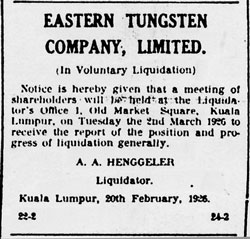
Archie was reported as being expected to return to Kuala Lumpur in March, although there is very little news of him in the records for 1926, and he may have been out of the country for the whole year.
All year there were echoes of the previous year’s litigation as a number of cases involving the Eastern Mining Company went through the courts. In the first the shareholders were suing Dr. Birnie, one of the directors. The action was discontinued in April, but interest in the whole case was revived in June when creditors of Poey Ken Seng, a former managing director of Eastern Mining Co. and now bankrupt, took the company to court for some of his shares. It was claimed in court that the reason the Company started the action against Poey Ken Seng was because he backed Mr. Peck against Archie who was also a director of the Eastern Mining Co at the time. In September a third case began in which one of the directors sued the Company. In this it was revealed that as far back as 1912 Mr. F. C. Peck wanted to be registered as a shareholder of Kempas Company. The directors made it a stipulation that he should not indulge in obstructive criticism and they refused to register him. Mr. Peck applied to the Chief Justice at Malacca Assizes to compel the Company to register him and the Chief Justice granted the order. It was also revealed that Archie owed The Eastern Mining Co. $40,000.
On 4 March Malayan Matches, which had been floated in 1919 went into the hands of the receiver. The directors sent an explanatory circular to shareholders explaining they had only been able to continue trading because J. A. Russell had advanced the firm $115.000 largely free of interest. Recent prosperity had raised the demand for higher wages from the workforce but they had not been able to raise the price of their product because of the keen competition from imported matches. Every effort would be made by the Board to work with the receivers to realise the company’s assets. It held its last A.G.M. in October presided over by Bob Russell. The factory closed down on September 30 and most of the machinery was sold.
Litigation in May by Mr. M.D. Simons against the owner of the Elkayes match factory at Port Swettenham, who had sacked him, revealed that he was also sacked by Mr. Robbins from Malayan Matches in 1923. His apparent lack of knowledge of chemistry may have contributed to the end of Malayan Matches. The Federal Council which put a tax on imported matches to try to encourage local industry discussed removing it.
In February the Eastern Tungsten Company went into Voluntary Liquidation. This Company had held its first A.G.M. in 1918, and had done business in wolfram in China. Archie had been a director with Mr. A. A. Henggeler.
From The Malay Mail, February 24, 1926. The National Archives of Malaysia.
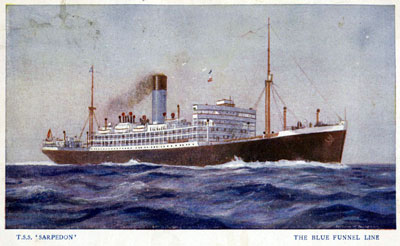
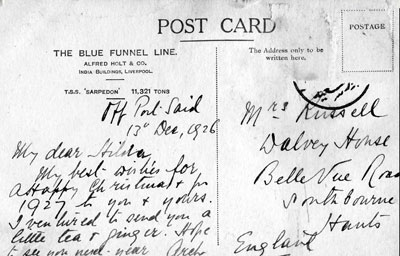
The 13th annual general meeting of Malayan Collieries was held in March. Mr. Ferrers chaired it although Archie was present. The Collieries were running well although wages had had to be increased. The mine was in good condition despite the floods that had inundated the country. It was another record year for profits. The company’s report showed the increased use of sand for stowage at Batu Arang. This came from the Pengkalen Kundang, which was also mined for tin ore to offset the costs of the sand mining. Opencasts 5 and 6 were nearly exhausted and two new ones were ready to replace them. The hospital was completed towards the end of the year and electric lighting had been installed to the shops and houses in the village. Six fatal accidents had occurred, two underground and four in the open casts. There had been enquiry into the deaths, which found they were due to unavoidable accidents.
Pamoekan Bay was suffering from a labour shortage; the number of people employed there was just under 600. James Barr the general manager explained in his report that: “Hakka is the only Chinese coolie who will work underground as a miner. The Hakka comes from Kwang Tung Province which has been in a state of turmoil for a long time and people from there could emigrate only under extreme difficulty”. One of the steam launches called “Lin Hin” had struck a reef and sunk on a voyage between the mine and Kota Baru. No lives were lost and the ship was insured.
Mr Hopson Walker, (Mr. Peck’s ally) was at the meeting and there were several exchanges between him and the Chair concerning Pamoekan Bay about which Mr. Ferrers refused to be drawn leaving Mr. Hopson Walker unsatisfied. Mr. Ferrers said: “that as they were a trading concern subject to keen competition it was not in the best interests of the company to disclose more facts than were given in the statement of accounts”. This decision may also have been a result of the recent court cases. Archie was re elected to the board of directors.
Archie travelled to England on the Hector on 12 May, staying for three months.
In late May, the Singapore Press reported on the visit of Sir Hugh Clifford to emigration depots in India. One young woman told him “she earned 50 cents (12 ½ annas) a day working at batu (stone) or at api (fire) on the coalfield of the Malayan Collieries, Ltd.”
A document in the office of the land revenue at Kinta dated 20 July listed the 9 lots of land in Ipoh, which were registered in the name of John Archibald Russell.
In a court case in July Keng Huat and Co., who were agents for Malayan Collieries’ coal, were charged with a breach of trust over money payable to Loxley and Co. Loxley had admitted receiving the money and the charges were dropped. A witness in the case was a Mr Bligh.
James Barr the General Manager of Malayan Collieries Ltd., resigned due to ill health in August.
J. A. Russell and Co. sued Mr. O. P. Dakeyne, of Sedgeley estate, in the Supreme Court in September, and the case was settled out of court. It is not known what this case was about.
In October Selangor Coconuts held their 16th A.G.M. The meeting heard that during the year, “the board was unfortunate in losing the service of J. A. Russell. Mr. Russell found that his business affairs kept him so much out of the country that he could not attend meetings.” Bob Russell was re-elected a director.
“Pud” Swettenham, the wife of Mr. R.F.R. Swettenham gave birth to a son on 27 October.
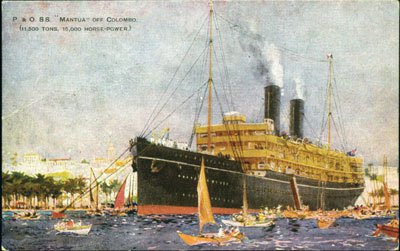
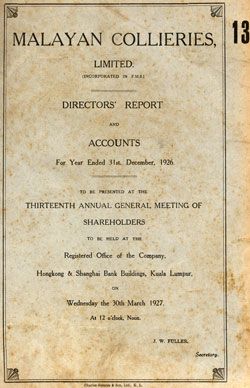
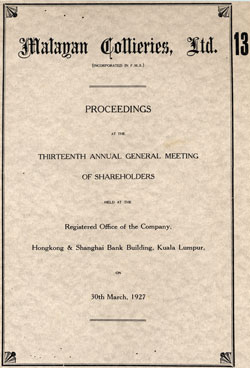
Construction in Ipoh
The Malay Mail recorded on 31 January that Archie was “ back from his holiday at home”. It reported that in Ipoh he owned the New town, and intended building 52 shop houses on the Yau Tet Shin Padang there, “which Padang the late Towkay Yau Tet Shin intended should remain forever a public playground”.
In late February Mr. Mudispacher, who had been the manager of Malayan Matches died at the age of 51 and was buried at Cheras in K.L.
Mr. Ferrers returned to K.L. “ looking fit “ which seems to imply that he had not been well.
Mr. Carver retired and left the F.M.S. after 23 years as a solicitor, the paper noted his role in the Peck vs. Russell case.
Malayan Collieries
The annual report of the Collieries showed higher profits for lower costs, and a total dividend of 22 ½%. Messrs. J A. Russell & Co. were the managing agents and were solely responsible for the managing of both mines from the date of the departure of Mr. J Barr early in the year who had been in a bad state of health. The position of general manager had been abolished and replaced with qualified colliery engineers. Mr. R. Rutherford, formerly of Ebbw Vale Co., South Wales, was engaged towards the end of the year as Mines Superintendent, Batu Arang, but was currently engaged at Pamoekan Bay.
During the year they had lost one of the F.M.S. railway contracts but had since regained it. At Batu Arang after 15 years of working there were now 12 miles of roads and paths and the electric locomotives hauling the coal from the face to the main incline covered 14,000 miles. The North mine was efficient and the East Mine was in development, an improvement on the established North and South mines. The remaining temporary buildings had begun to be replaced, with standard village shop houses and quarters. Electrifying all the surface operations was being investigated, as was a new water supply. The hospital was running well.
At Pamoekan Bay production continued to be confined to the top seam. Several faults had held up the development. 6 coal cutting machines were in use with a new power driven bore capable of reaching a depth of 800 feet, a new fan was being installed. New pumps had been ordered, the power station augmented and an ice plant introduced. 59 ships had been loaded with coal.
The 14th A.G.M. of Malayan Collieries was held on 30 March. It was the first Archie had chaired since 1924. He said it was a record year in terms of tonnage and profits. Everything was running smoothly, they had chartered ships to run a schedule and were investigating if it would save money if they owned their own ships. At the end of the meeting there was a special vote of thanks to H.H. Robbins.
Although not mentioned in this years report Malayan Collieries bought the buildings and land of the failed “Malayan Veneers and Plywood Co., Ltd”. It had originally been the factory of Malayan Matches and adjoined the Batu Arang mine.
New Industries
At the 11th meeting of the Cameron’s Highlands Development Committee in July an application to the Resident in Pahang for land by A. B. Milne for 5,000 acres, was discussed. Should so large an area be alienated to one individual? They replied to the resident: “The application of Mr. Milne was referred to the Committee for consideration. It was considered that the question of the alienation of this land did not at present fall within their province, but they wished to point out that it was not possible at present to state what facilities for access it will be possible to give through the Highlands.” He was granted the land by October.
The Malayan Tin and Rubber Journal published in December contained a long and detailed article by A.B. Milne on “The Possibilities of Tea Cultivation in the Malay Peninsula.” It discussed how Malaya’s investment in rubber had meant that other industries had been neglected and its highland areas forgotten for 20 years. It noted the demand for tea, and the quality that could be produced in high areas. It detailed his investigations into suitable areas, with access the greatest problem. It covered soils, average rainfall, wind speed, availability of labour, estimated costs and expenditure and planting, and encouraged the Government to assist developers.
Archie’s plans for new industries appear to begin this year, the year that also marked the start of the worldwide slump.
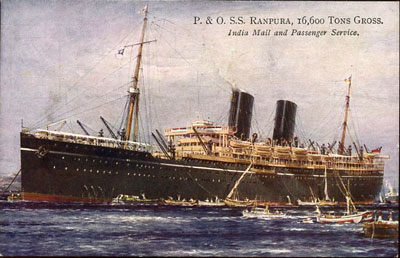
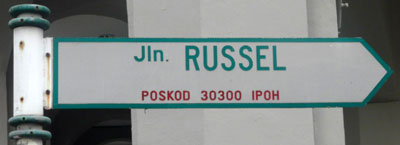
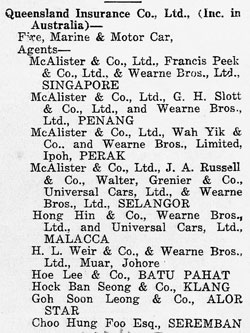
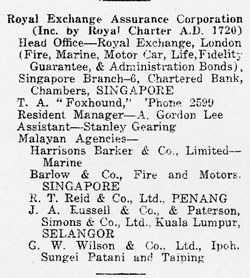
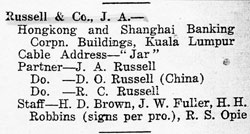
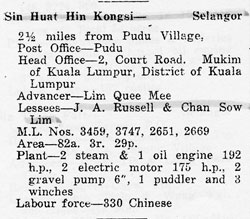
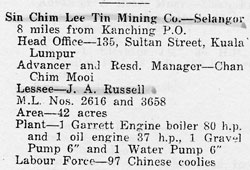
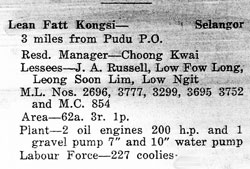
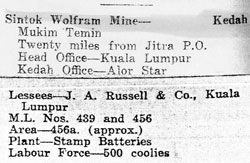
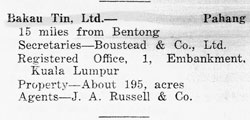
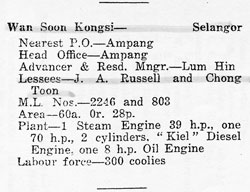
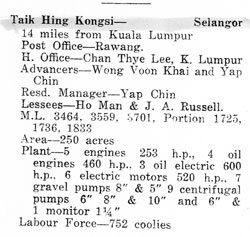
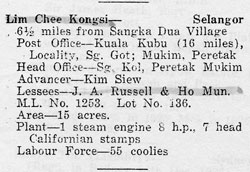
Archie arrived from London on the P. and O. SS Macedonia in late January.
The Beginning of Boh Tea
In March the papers reported that Archie had made an agreement with A. B. Milne to open up a large tea estate of 5,000 acres in the Cameron Highlands. "Boh Plantations Ltd" was registered in 1929, with a nominal capital of $500.000.
The Collieries
The report for the Collieries recorded a record output and record profits. At Batu Arang a development programme for the next 3 or 4 years with considerable expenditure had begun, to make the colliery modern and efficient. The new water supply, which would come from the Forest Reserve area, had been surveyed. This called for 2 miles of pipeline. At Pamoekan Bay the new Mining Superintendent Mr. Rutherford had “failed to uphold his very considerable Home reputation under Tropical and Asiatic labour conditions” and been sacked. The colliery employed over a 1000 people, with a total resident population of over 2,000. A new steam launch had been bought. 53 ships had been loaded with coal. The colliery had acquired a site on Fraser’s Hill and was about to begin building a house to provide a change for company staff.
Archie presided at the 15th A.G.M. of Malayan Collieries in April. He was pleased to report that revenue had reduced but profits had increased. They had reduced prices and introduced a zone system so that all customers on the railway system paid a uniform rate. At Pamoekan Bay they had sub chartered the returning empty ships by carrying general cargo and become a general shipping business, as ocean carriers of other goods as well as coal. They had difficulty in finding ships large and fast enough and might decide in future to become deep sea ship owners. A large programme of capital expenditure to modernise the plant at Batu Arang meant that all the open cast equipment, which had been bought during the war, and the north mine haulage equipment bought 15 years ago would be replaced with electrically operated machinery. The central power plant would be replaced with turbo alternator sets of 4 times the capacity. More research had been carried out on the briqueting of fuel; they were trying to improve the use of coal in steam dredging plants. A shareholder complained that the shares were now very difficult to get in small numbers. At the end of the meeting Mr. Cunningham proposed a vote of thanks to the managing agents “for the very efficient way in which they have managed our mines and I might say that the extraordinarily good balance sheet which your Directors have been able to put before you today is very largely due to their untiring efforts. In conjunction with the managing agents, I should like to mention the name of their Manager, Mr. H. H. Robbins, whose wide range of technical knowledge and indefatigable energy has been of vast help to the company. Mr. Robbins had a seat on the Board during Mr. Russell's absence on leave and he was a tremendous asset to us and we only hope that during the current year it will be possible to find a permanent seat for him on the Board (Applause).
In May Mr. C. Jones arrived to develop the installation of electricity at the mine. In July Mr. James Brailsford was appointed assistant manager at the Collieries, while Mr. L. Richards manager of the open casts at Batu Arang left for home.
In July the papers reported the building activity at Fraser’s Hill.
In December tenders were invited for the construction the spillway and dam and two reservoirs to hold 85 million and 64 thousand gallons of water at Batu Arang.
J. A. Russell & Co's only rubber concern in this directory was for the
Sungei Tua Estate- Bukit Bisa Estate (Kajang)
Douglasdale Estate (Kuang) ‘Phone 631, Kuala Lumpur Proprietors- J. A. Russell & Co. Manager- E.S. Middlecombe Total area, 909, 200 and 250 acres respectively
Fully planted Acreage in tapping 1100 acres
Output under restriction (as at 31.8.27) 412,100 lbs.
Ho Man who is listed as a partner in the Taik Hing Kongsi near Rawang had been the contractor for the open cast mines at Batu Arang and considered by Archie as a possible partner in the development of Pamoekan Bay if Malayan Collieries had not bought the option.
During the year there is correspondence between J. A. Russell and Co. and the Resident at Pahang to renew various mining leases . "The property of the Bakau Tin Limited, known as the Chinchong Group consists of eight contiguous Mining Leases, of which M. L. 502 is one." The resident refuses the renewal of one of the leases at Bentong. Bakau Tin Ltd took over the land in 1916 no effect was made to bring this plant etc. into use till Kon Chin Kwee got the Sub-lease in 1927....Bakau Tin should not get credit for a labour force due entirely to the efforts of the Sub-lessee."
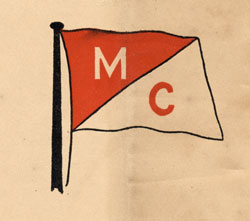
Above: The New logo of Malayan Collieries used in their 1929 report for the first time.
In April Archie attended the funeral of Mr. Ivens who had acted as the lawyer for Malayan Collieries during the litigation with Mr. Peck.
In January Archie arrived via the P. and O. SS Macedonia.
In May he left for Europe. At some point, while he was in London, he must have visited Pud Swettenham at her house in Montpelier Row in Twickenham since it was mentioned later in her divorce case. In February her child had died aged 2 at a private home "for those of mental deficiency" in Teddington.
Malayan Collieries
The new electrical engineer at the Collieries Mr. C. Jones read a paper to the Perak Branch of the Engineering Association of Malaya about the use of electrical power in mines. He urged that all installations had manuals in different languages to assist in the training of local staff.
The Collieries annual report showed an increased demand for coal, and no problems with supply. Progress had been made in re-equipping Batu Arang. At Pamoekan Bay output had been slowed down deliberately because of the depressed state of the markets, and labour was concentrated on development work. The Government had agreed to give the Company agricultural rights at Batu Arang and they were investigating how to use these. Mr. Fuller had left and J.A. Russell and Co. had once again become secretaries of the Company. H.H. Robbins had become a director. The East mine had gone into production and preparations to mechanise the open casts were under way. The power supply was being prepared for a switch from D.C. to alternating current. The new dam for the water supply was about to be built and the new modern brickworks was under construction.
In April Archie chaired the 16th A.G.M., pleased to report a record turnover, and saying their aim was to reduce prices further. Batu Arang production was up about 20% but Pamoekan Bay had had labour troubles with the Chinese miners. The Dutch Government was considering converting Pamoekan Bay an open port. Land has been bought at Fraser’s Hill. An extensive plan of re equipment has been undertaken the largest item being a new power plant. He referred to the worldwide depression and uncertainty about future demand. The government had agreed agricultural rights to the land above the mine, but they had not decided what to plant, and research had begun into the manufacture of cement. The new brickworks had begun and Archie placed a specimen of the machine made coal fired brick on the table for inspection, commenting that it was superior to anything currently made in the F.M.S. They intended to make 10 to 12 million bricks per year, converting the clay and shale from the open casts into a useful side industry. In view of a gloomy economic forecast money had been saved to continue development.
Mr Ferrers alluded to previous meetings when he thanked Archie saying “ Their chairman had been connected with the company since its inception, it owed its existence to him, and it must have been a great satisfaction when he presided over a meeting of that kind and found that he had not had to put a single resolution which had not been unanimously accepted.”
The following week the Straits Times commented: “Malayan Collieries are a real asset to this country, and everyone will probably agree that that asset is being wisely handled and developed with due regard to the rights of consumers.”
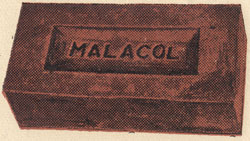
Tin.
In April there was more correspondence about the renewal of mining leases at Blanja. In June leases at Rasa were approved on behalf of Bakau Tin. Their Company report noted the Government’s actions re the leases renewal, which had been made to sub lessees, which were financed by Chop Thye Yeng Chan, the Kuala Kulu office of Messrs. J. A. Russell and Co.
was such a lovable man. I think that anybody who ever knew him well must have loved him. God rest his dear soul.
Yours with love,
Archie.
This letter although written to Bob was kept by Agnes and Cecil Rough and photographed in 1985.
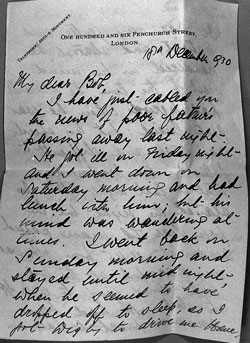
Archie was booked to board the P. and O. steamship Comorin on 28 November, which arrived back in Singapore on December 27th, but his father Jack was very ill and Archie stayed in the U.K. until Jack died in December. Archie wrote to Bob about their father’s death.
106,Fenchurch Street London 18 December 1930
My dear Bob, I have just cabled you the news of poor fathers passing away last night. He got ill on Friday night and I went down on Saturday morning and had lunch with him, but his mind was wandering at times. I went back on Sunday morning and stayed until midnight, when he seemed to have dropped off to sleep, as I got Digby to drive me home.
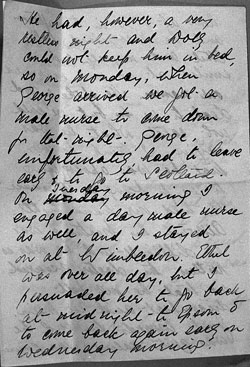
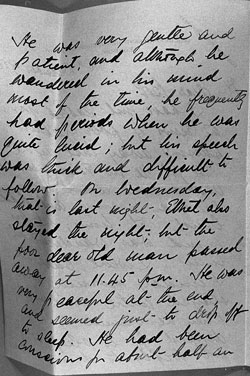
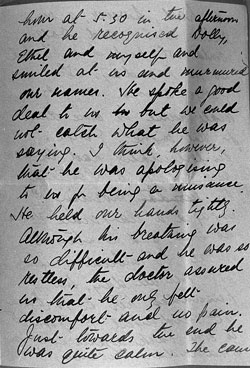
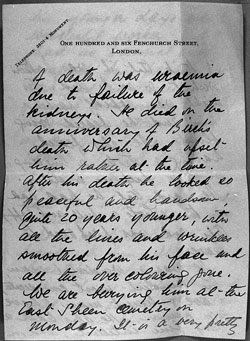
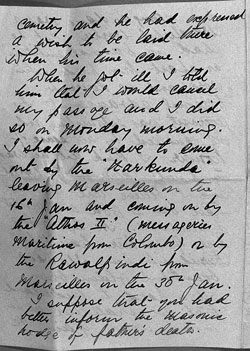
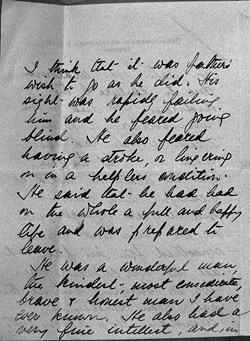
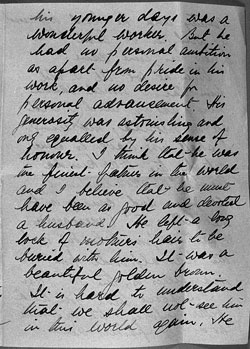
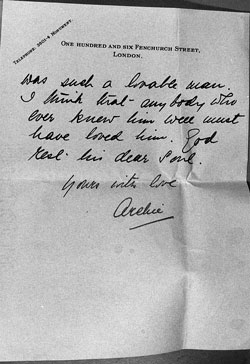
1930 was the year that John Drysdale began to work for J. A. Russell and Co. Drysdale had worked in Babcocks Glasgow office. Babcocks Boilers in Malaya used Batu Arang coal. A Babcock man going round Malaya visited Batu Arang and Archie was impressed with his visit and offered him a job, but he couldn’t take it. Archie said he wanted a man with similar experience. Drysdale had visited most power stations in the U. K. Archie interviewed him driving around London in a sound proofed Rolls Royce. They had a chat, had lunch together, and signed and confirmed the job. (Notes from conversation with Rita Drysdale.) John Drysdale was in overall charge of the Coal Mines and Plywood Factory at Batu Arang and built the Wood Distillation plant there.
Archie's chauffeur John Digby mentioned in the above letter and probably the driver of the Rolls on which Drysdale was interviewed, lived at 8, Spring Mews, Crawford Street, Baker Street, London. Archie left him some money in his will.
Malayan Collieries
The Collieries report showed that H.H. Robbins was now deputy chairman. The depression had meant that there was greatly reduced demand for coal, due to so many tin-dredging plants shutting down. The Collieries reduced the cost of the coal to all its customers. The output of Pamoekan bay was kept low, normal stocks were carried, but below the costs of production, a washery had been built and the mine supported a population of about 2,000, 678 of which were employed on the mine. At Batu Arang the re equipment and electrification was continued. More plant and machinery had been bought using money borrowed in London. The new powerhouse was completed, the new water supply was the only unfinished work. Construction work on the dam was well advanced, and would flood 25 ½ acres and was expected to be functioning by 1931. All the coal from the deep mines had been replaced with sand some of it coming from the No. 7 open cast. The new brickworks were completed and ready for commercial production. The resident population was now 4,000.They had obtained a prospecting licence in Johore where they thought there might be coal, but after core drilling and prospecting it had been decided to stop as finding commercial amounts seemed to be unlikely. Some of the investments had been sold.
Archie chaired the seventeenth A.G.M. in March. Because of the falling demand for coal, he was unable for the first time to report record outputs and record profits. The decline in trade had been far greater than was expected, prices to consumers had been lowered. Pamoekan Bay’s production was down by 26.40%. They would close it if it began to be a liability on the Company. Some investment money had been used to continue the re-equipping of Batu Arang. The biggest item being the power plant, as well as the water supply, which was half paid for, earthworks for a new railway deviation were nearly finished, and the brickworks were completed and paid for. Agriculture was still being investigated, and investigations into cement manufacturing had been completed. But there was unfair competition from non-British producers who dumped their goods in the local market at below cost. Given some measure of protection against this he felt that cement manufacture was an attractive proposition. Brick making would be extended to include tiles and glazed pipes. There has been research into making plywood packing cases, logs had been sent to Europe ,research made into glues, and the works had started up on an experimental basis. The factory would be brought into production this year. Archie used the meeting to talk about Malaya’s position and its need for more manufacturing industries to boost exports and the sort of action the Government should take. Not by financing companies but by building railways, and giving new industries sympathetic consideration.
In June the Collieries took the insolvent Siput Tin to court for payment of $21,468.
In October H.H. Robbins was a guest of the Institution of Civil Engineers at their AGM. They had been given a tour of day of the Collieries on 27 September and surprised by the extent of the activities “it was stated by many that the average impression of the Malayan Collieries was that they consisted of a hole in the jungle, instead of being of the vast proportions that they are. A break was made at midday for tiffin, which was kindly provided by the Collieries in their office. At the conclusion of this tiffin, Mr. H.H. Robbins, on behalf of Malayan Collieries Ltd., stated how pleased he was to be able to welcome the members of the Malayan Association of the Institution of Civil Engineers, and he hoped that the members would enjoy their visit. Mr. F. M. G. McConechy and Mr. R. D. Walker in reply on behalf of the Association, stated that they were extremely indebted to Malayan Collieries Ltd., for a highly successful visit. The whole arrangements were a triumph of organisation and they could safely say that it was the most interesting visit they had ever paid. At the conclusion of the tiffin, visits were made to the brickworks and to the plywood factory.
In December the Straits Times reported that in November a duty had been imposed on the importing of cement, which had increased its cost by 30% to 40 %. It quoted Archie’s speech at the A.G.M. and recorded some of the previous unsuccessful attempts to manufacture cement in the F.M.S.
By the end of the year The Straits Times suggested that the collieries should reduce their prices during the slump, rather than pay a dividend of 15% for the year.
In August ship passengers lists noted that the following passengers were leaving Singapore by the Ranpura on August 21 for Penang, Colombo, Bombay and Europe. Mr. J. A. Russell and Miss. K. S. Archer.
Kathleen Archer interviewed in the 1980s told this story about meeting Archie: She had a friend called Wanda Fish who was in love with the Dutch Attaché in London. Unfortunately he was not in love with her. A Mr Howden wanted to marry Wanda but he was stationed on a gunboat in Shanghai for seven years. Wanda, having decided that the Dutch attaché Otto, didn’t want her, decided to go out and marry Mr Howden. She asked Kathleen to go with her. They sailed on the Montcalm from Liverpool. They crossed North America and sailed from Vancouver to Japan. When they reached Shanghai Howden wasn’t there. They stayed at the Cathy Hotel for ten shillings a day, all meals included. It was very French and glamorous. Howden finally returned. He spent all of one night talking to Kathleen about whether he should get married or not. They finally embarked on a small river steamer belonging to Jardines to go to Hankow. There had been an offer to Kathleen to visit Peking but she declined and always regretted that decision. On the evening before the wedding Howden asked Kathleen whether he ought to marry Wanda. They did get married. Kathleen had a blue and white striped dress, which she washed and it all ran. Kathleen returned to Shanghai and then sailed for Penang to meet a friend called Pat Denier whose husband was employed by the Hong Kong bank. Pat Denier asked Kathleen to get off the boat because she was not speaking to her husband and she needed someone to talk to. Kathleen agreed to spend ten days with Pat. Kathleen booked back on the P. and O. Ranpura. The boat was a mass of streamers, there was general uproar and it was all very jolly. Kathleen and the Deniers and other friends were sitting at one table and Kathleen noticed a man at another table. He was covered in garlands and talking to both Chinese and Europeans. Kathleen asked who he was. The answer was: “Oh he is Malaya”. During the first stage of the voyage Kathleen considered Archie a bluestocking and warned him off. At every port Archie asked her to go out with him. Consequently they shared entertaining experiences, for example at Aden. In Port Said fortune-tellers came along side the ship and Kathleen was told that “something will happen to the lady in September but the gentleman will not be so lucky”.
They must have decided to get married very quickly since a written marriage settlement made between them with Don Russell and Kathleen’s father acting as trustees was dated 12 September and they were married on the 14th. The Straits Times reported their wedding in Cheltenham on 17 September.
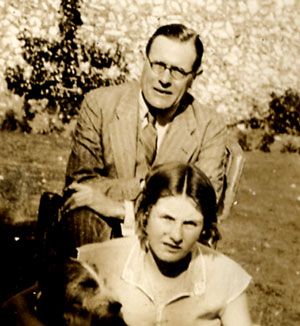
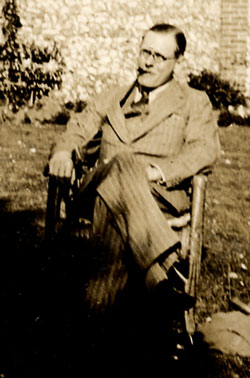

Malayan Collieries
On January 24 his Excellency the High Commissioner, Sir Cecil Clementi, the Hon. Mr. A. Caldecott, acting Chief Secretary to the F.M.S. Government, and the Hon Mr. J. A. Strachan, general manger of F.M.S. Railways, visited Batu Arang. Accompanied by Archie and Mr. H.H. Robins they travelled by train from Kuala Lumpur and inspected the mine, powerhouse, workshops, water supply, stripping operations, the brickworks, sawmill and plywood works.
The collieries report explained how the depression had affected sales, but investment in cost reducing equipment had paid off. Pamoekan Bay had been closed down, and all useful and moveable plant moved to Batu Arang. The water works had been finished and the only large construction work to be completed was the washery and the railway line deviation. With decreased demand the underground development in the North and East mines was stopped. The mine was working at less than half of its capacity two days out of three. Coal cutters had been reintroduced. The sand pits used for hydraulic stowage were closed since enough material could be found from the stripping and crushing operations of the mine. The electrification was completed. 6.3 million bricks had been produced. Prospecting at Bidor in Perak had found good china clay, but the government was being slow in their response to an application for a lease. A ceramic chemist had been employed to perfect mixtures for pipes and tiles. Plywood production began and ply for building and ply chests were produced and sold all year. The Prospecting rights over a limestone deposit had been obtained with a view to cement manufacture, and sampling of the deposit was in progress. Small-scale agricultural experiments had concentrated on the canning of pineapples. The resident population at Batu Arang was the same as last year and had been encouraged to grow fruit and vegetables and raise pigs to reduce the cost of living.
The 18th annual meeting took place in April. Archie informed the shareholders that due to the depression and loss of customers to rival coal producers Pamoekan Bay had had to be closed. The washery from Pamoekan Bay was in the process of being re-erected at Batu Arang. There had been a large reduction in European staff. The railway had lost a lot of custom and had increased its freights charges, and the Collieries were paying for these for their customers. They had decided to pay a dividend of 22-½% for the year in order to help keep money in local circulation. He described the new industries that the Company was exploring, including plans for cement manufacture. The Government had imposed a duty on imported cement since the previous year, which would help to establish a local industry. They had arranged for the visit of a cement expert who was due to arrive in the country that day. They believed they would be able to compete in markets outside the F.M.S. and if his report confirmed that view they would form a definite scheme. The new plywood factory was now making plywood chests, although customers didn’t seem to want the pink ones made from redwood and preferred the more expensive white ones that they were used to. The brickworks were well established. Research at the laboratory at Batu Arang was being undertaken into local earths and clays, in order to make glazed roofing tiles and pipes. They were exploring growing pineapples in order to can them, and investigating planting oil palm. 70,000 pineapple plants had been imported from Honolulu and were just coming into fruit. They considered building a large canning factory but at the moment sales were poor for Hawaiian producers. As usual he criticised the Government for not supporting new industries. He said that J. A. Russell and Co. had considered a large number over the years. One he mentioned was a steam power station in the Kinta Valley. In concluding he said: “ I might say that this country is not singular in its misfortunes, the deflation from which it is suffering being mainly due to the depression of the whole of the rest of the world. Unless you think that the greater part of the civilised globe is not in our times going to recover, you must, therefore believe that Malaya itself will within our lives regain prosperity. It is only a question of how long it will take to do it. One or two, perhaps three or four or even more years; but eventually it will come, although the country may never be able during our own period to indulge in quite as many of the luxuries, if not indeed the extravagances, of all forms of administration, private and public, as it has in the past. Despite that, I believe this country will eventually reach a volume of production and trade still unattained. The percentage of profits will no doubt be smaller; but the total value much greater. I cannot, in fact, conceive that so favoured a country as Malaya is economically finished; if it be, then the rest of the earth is economically at an end. Holding as I do to this belief, I have every faith in the future of Malayan Collieries Ltd. Financially your company is in a sound position, and I am of the opinion that it can weather any likely storm, under closed furled sails may be, and perhaps with little to spare, but come though it will.”
The following day Archie’s stirring speech was quoted in the Straits Times Leader article with approval: “Countries are like human beings- they need a tonic occasionally, even though it is only a bottle of sweet-tasting coloured water- and those that can supply it are public benefactors. Among such we must class Mr. J. A. Russell, the chairman of Malayan Collieries, Ltd. No chairman relishes telling a meeting of shareholders that contracts have been lost, receipts fallen off, dividends reduced and another black year has to be faced but Mr. Russell could do this and still strike an optimistic note in his speech- not the futile kind of optimism achieved by putting one’s head in a hole in the ground, but the calm reasoned optimism of one with special knowledge and sure grounds in his beliefs. Lest Mr. Russell’s message of hope be overlooked in the mass of print under which it lies buried elsewhere, we reproduce it here and give it our most cordial endorsement…. Thank you Mr. Russell”
On 15 April a leader article in the Straits Times looked at Malayan Collieries with approval: “Malayan Collieries Limited has always been a company of outstanding originality and energy, but it has never done anything more remarkable than the payment of a twenty-two and a half per cent, dividend during the worst year in Malaya's economic history” it looked with interest at their new industries and Archie’s promotion of local products over imported ones, his criticism of certain officials and ended with the words: “Mr. Russell’s speech is as good a tonic as has been offered to the Malayan public for many month past. He has shown his own company to be an energizing and progressive force in the country’s economic life, and he has expressed his personal conviction that unless the world is economically finished Malaya is not, and never will be, finished.”
At the Malayan Exhibition in Kuala Lumpur in August the number of locally grown samples of tea available were noticed. On the Malayan Collieries stand the new Malaply plywood packing cases for rubber were exhibited, sold at rates below the imported ones. The collieries won the gold medal for the best display of Malayan produce, and received a visit from the Sultan of Selangor in the same month.
The ply rubber cases were heavily advertised from August to the end of the year.
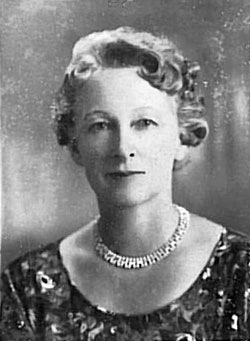
Boh Tea
On 27 February the Straits Times reported a talk given by Mr. M. J. Kennaway giving a review of tea cultivation in Malaya. He said:” For consistent and what I might call commercial results we must look to the Boh Valley Plantations Ltd., which I understand come into bearing in the near future. To the financiers and general managers of this property, Messrs. J. A. Russell and Co., who already have 600 acres planted in tea, this country is under a debt of obligation, as, without the enterprise there shown there would have been no upcountry tea produced on a commercial scale for another four or five years”. By March Mr. Milne had "severed his connection" with Boh.
In July an article commented that at Tanah Rata the, department of agriculture’s tea production was delayed, and that it is not using the latest methods. To see if tea was going to be successful they would have to wait until Boh comes into bearing. Boh’s methods were more up to date. John Drysdale spent time on meterological observations at Boh, deciding where to put the factory.
On Kathleen's first visit there, being pregnant, she was carried up the bridle path to the estate in a sedan chair while Archie walked beside her in the pouring rain. On arrival cold and wet with no dry clothes he went down with a bout of malaria. Archie gave a lunch for the British Resident and other guests at Boh in July.
The engagement ring Archie gave Kathleen was a tiny emerald. It may have been tiny because nothing larger was available in Malaya or because he did not have the money. Kathleen had to make do with a second hand pram for Tristan because all the money went on making the road to Boh. Archie began selling off assetts. His house at Port Dickson was sold to Collieries director Freddie Cunningham.
Rubber and Tin
The 1932 directory of rubber estates showed that J. A. Russell ran a 1,750-acre estate in Johore.
Further correspondence took place about the renewal of mining leases at Blanja which are approved.
In September J. A. Russell and Co reported as managing agents of the Bakau Tin Company, which had made a profit and Bob Russell was still a director of Amalgamated Malay Rubber, which was in a strong financial position.
In March a retrenchment commission was set up and Archie and Mr. Choo Kia Peng who were members of the 1922 commission, were chosen to sit on it with the approval of the newspapers: “Mr. J. A. Russell, the third unofficial member of the commission, is beyond question one of the ablest men in the commercial and financial circles of Malaya. He is the brain behind Malayan Collieries, a highly prosperous company which is not content with coal-mining but is branching out in half a dozen ways, and the part which Mr. Russell’s firm played in financing Boh Plantations, the first hill-country tea estate in Malaya, elicited a warm compliment from Mr. M. J. Kennaway in an address to the Kuala Lumpur Rotary Club the other day”
In October the Retrenchment Commission of which Archie was a member issued its report. The Government spending was $56 million and the report suggested that it must be reduced to about $41 million or about the level of spending for 1922. A list of cuts was suggested. In December the 100 page magazine Straits Produce included J A Russell in its” old residents gallery”
The case did not appear to have damaged Archie’s reputation as at the end of June he was one of the guests at a luncheon given by the Sultan of Selangor in Klang.
On 7 July Archie signed his will, countersigned by John Drysdale, appointing his brother Don, H.H. Robbins and Andrew Beattie of the London Branch of Loxley and Co as trustees. He wanted them to keep the businesses going. He left money to his new wife, to his brothers and their wives and children He also left money to his godsons and to several female friends, and to his London doctor and London chauffeur. He left an annuity to Dolly Godwin but Pud Swettenham was not mentioned. However he made alternative financial arrangements for her which were paid through J. A. Russell and Co. and in later years were a larger ammount than Kathleen received from the trust fund.
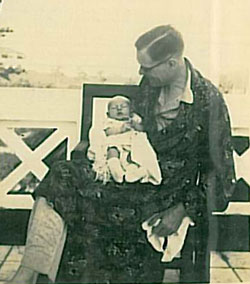
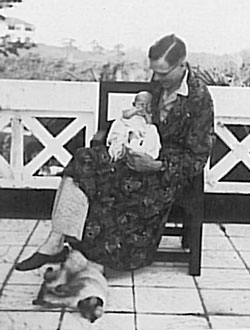
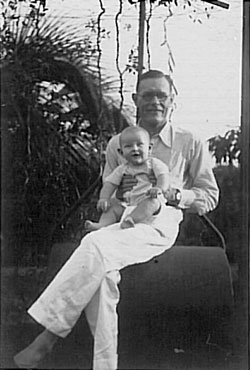
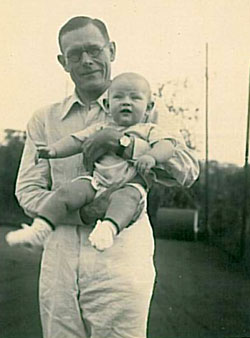
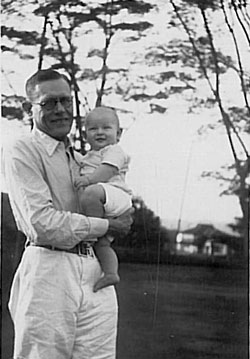
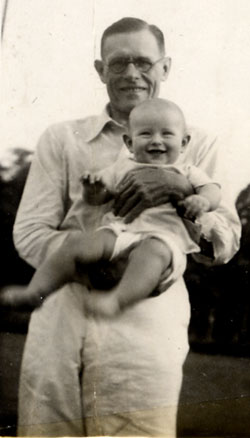
In June reports copied from London papers revealed that Archie was co-respondent in the divorce of Mr. Richard Francis Ross Swettenham, civil servant in the F.M.S. Archie paid for Swettemham’s wife Dorothy, (who was called ‘Pud’), to live in a flat in London at Montpelier Row, Blackheath. He agreed to be co –respondent for her in her divorce from her husband, visiting the flat in 1930 and 1931. Swettenham subsequently sued Archie for £2.000 for taking away his wife. Pud and Archie filed answers denying misconduct but did not defend the suit. Archie paid the £2,000 damages. Family history has always understood that he did this as a favour for Pud.
Swettenham, who was deputy Commissioner of Trade and Customs in Kuala Lumpur, never forgave him. Before his death at the age of 55 in June 1938, Agnes Rough bumped into Swettenham at the Talbot Arms in Lyme Regis where she was working. She introduced herself, having met him once or twice with Bob Russell. When she explained that she had met Swettenham with Bob Russell, Swettenham replied “Don’t mention the name of Russell to me - he stole my wife”.
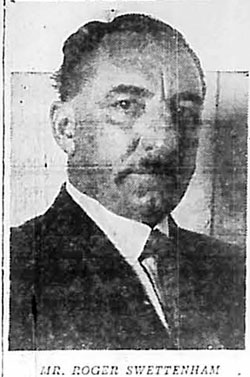
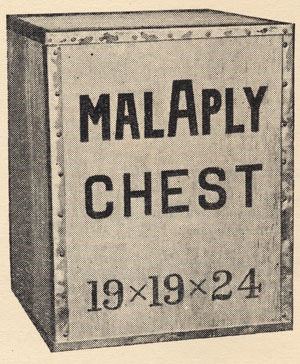
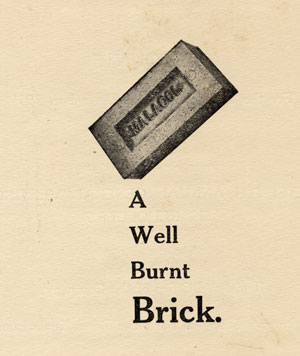
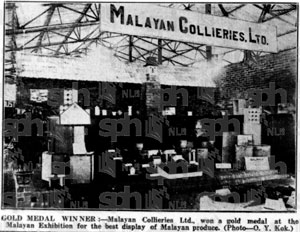
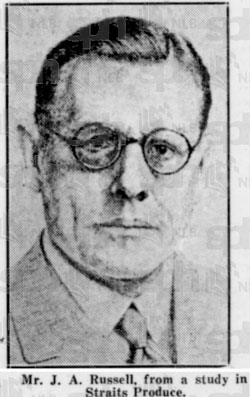
Boh Tea
In January several articles in the Straits Times commented on the fact that Boh Tea were using Sakais on their estate. They said that Boh had been bold and original from the start, and in crops grown and manner of cultivation was entirely unlike any other estate in Malaya. Mr. A. B. Milne had asked the Sakais not to kill the local birds and given them an area to live in and cultivate crops. The factory there was due to get going by the end of the year. J. A. Russell had also been allotted 1,500 acres on the Perak side of the Highlands. Continuing criticism of the Government for failure to produce reports on their tea experiments in the Highlands were voiced in the press.
Archie was taken ill on the evening of 19 February. The paper reported that he had an operation for appendicitis. The operation was successful and he began to recover being “much better” by 27 February.
In March the British Institute of Chemistry held their ninth annual meeting and dinner. They had paid a visit to Batu Arang and were all “greatly impressed with the efficiency of the organisation, by which no portion of raw material was wasted” and expressed their sympathy towards Mr. Russell in his illness. Archie was noted as giving $100 to the European Unemployed Committee in March. Advertisements appeared in the papers for Koela Plant, run on charcoal gas that could be fitted to a lorry or tractor. It was made in England and J. A. Russell was one of the local agents.
Collieries Report
The report of the Collieries noted the continuing depression with sales only 60% of those of the previous year; within the current year they expected an even lower demand for coal. Pamoekan Bay had stayed shut, but developments at Batu Arang had continued, including buying more railway materials and timber milling equipment. They had applied for a timber area within reach of the railway. They had acquired a second hand wood distillation plant which had originally been built in Pahang, by the liquidated Malayan Wood Distillation Ltd. and hoped to make it a success in the current year, using up waste. The Government had refused them the lease over a clay area near Bidor. All the research into cement production, transportation and marketing had been completed and their proposals had been passed to Government for a decision. The coal washery was put into production at the end of 1932. The north mine was closed entirely, while the East mine was kept open. A fire had occurred and the area had been sealed off. A coal testing laboratory had been erected at the washery. The extension of the water supply was in progress and the new Tamil lines had water borne sewage arrangements built in. The production of bricks had resulted in large stocks; the continuous kilns were shut down and only the intermittent kilns used. Successful experiments with roofing tiles meant that they had decided to install a plant for small-scale production. There was full capacity production at the plywood plant and they were preparing for a doubling of output. The experiments with pineapples were not successful and they had decided the soil was unsuitable.
A leader in the Straits Times of March 24 commented that Malayan Collieries shares could now be classed as gilt edged securities, and that the collieries made half a million in profits last year. It criticised the high dividends in the slump when the F.M.S. Railways, their main customer, was making heavy losses and had to go to Government for a loan, which would be paid by taxpayers. They looked forward to hearing Mr. Russell’s reply at the annual general meeting next week.
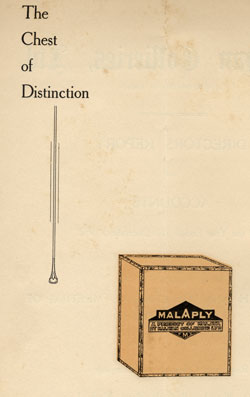
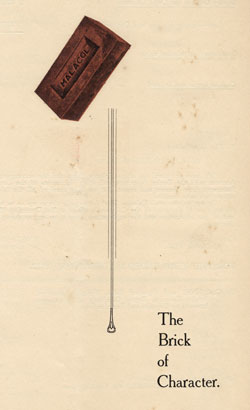
Collieries A.G.M.
But Archie although he had written his speech for the 19th A.G.M. was unable to give it himself. On 28 March complications had set in and he was admitted back into the General Hospital in Singapore for another operation.
Mr. H. H. Robbins, as deputy chairman, announced that Archie was too ill to be present, and read his speech. Archie called the past year “gruelling”. Pamoekan Bay remained shut down, and sale of Batu Arang coal was down. The Government had invested huge sums in two hydro-electric projects including the Perak Hydro Electric Power Company, which had created unfair competition. It meant the Government would lose a large sum of money in coal royalties. He described the brickworks, which had provided “bricks for the construction of all the principal buildings within our radius of deliveries,” roofing tile manufacture, and plywood production, for chests for transporting rubber, sold under the registered name “ MalAply”. The wood distillation, plant would produce charcoal, wood-alcohol, acetate of lime and a wood preservative. They had bought a complete sawmill and all the rolling stock needed to take the logs to it. J. A. Russell and Co. had spent four years investigating logging and the use of lumbar and had given all this information to the Collieries. The most important undertaking was the proposed cement works, with its quarry and transportation system. The Government had not yet responded to their plan. He commented that Malayan Collieries employed 3,000 people supporting a population of over 5,000. It paid for its own police force at a cost of over $75,000. They will inevitably have less business so it must diversify.
Mr. Robbins took the opportunity to deal with the criticisms of the Straits Times leader, pointing out that the government had damaged the Collieries by investing 12 million dollars in a rival company. The meeting noted Archie’s absence: “I should like to refer to the regrettable absence of your chairman. Mr. Russell has been intimately identified with this company since its inception, and of course it is unnecessary for me to say that the measure of success achieved has been primarily die to his guidance. Mr. Russell has presided at seventeen annual general meetings in the nineteen years’ life of the company, and though at the moment too ill to be with us, his thoughts are no doubt with us and I know you will join us in sending him a message that we sincerely hope he will be spared to preside at our meetings for many more years.” Archie was re-elected as a director.
The following day, 30 March , the Straits Times Leader article backed down on its previous criticism saying: “A very full and detailed reply to the comments made in this column last week on the payment by Malayan Collieries of a fifteen per cent. dividend at a time when their principal customer, the F.M.S. Railways, are running at a heavy loss, was made at the annual meeting of the Collieries company yesterday. In the absence of Mr. J. A. Russell, whose serious illness has aroused anxiety among all who are concerned to see the industries in this country conducted with efficiency and foresight, Mr. H. H. Robbins dealt with our criticisms, and did so very effectively and at the same time with a moderation which is duly appreciated.”
On March 31 the Straits Times noted that there was no change in Archie’s condition and added “Mr. Russell is now lying ill in hospital in Singapore, but the very able speech delivered at the meeting yesterday clearly bears the impress of his forceful and original mind, and at a time when nearly all industrial undertakings are marking time it may be commended to our readers as being, in those parts of it which relate to subsidiary undertakings at Batu Arang, the most progressive and optimistic address which has been made by a company chairman in Malaya for a long time.”
The papers of 4 April another Strait Times leader criticising the profits of the Collieries.
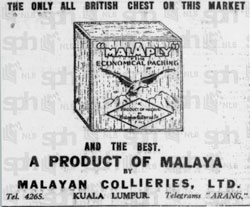

Archie's Death
The papers of 8 April carried the news of Archie’s death the evening before, and his funeral that day at Bidadari cemetery.
The Straits Times called him “One of Our Greatest Business Men.” The obituaries detailed his career and businesses in four continents:” W. H. Loxley and Co., (London), with branches at Hong Kong and Canton; Perrin, Cooper and Co., Shanghai and Tientsin, the financial control of the North China Wool Co., of Tientsin and the Loxley Wool Co., (Pty). Ltd., of Cape Province, South Africa”
The Malay Mail said: “His whole career has been a business romance of such magnitude that it cannot be compared with the achievements of any other European in Malaya - past or present.”
“Of slight built and with a quiet somewhat retiring manner, his success in life was entirely due to his mental equipment. “ He looked the student rather than a hard-headed pushing business man. He had no particular hobbies outside his business and his books. He made no parade of his wealth. He was whimsically cynical at times when talking with old friends but his smile betrayed the kindness of his heart.”
Local businessmen attended the funeral, with a large number of flowers from distant friends and relatives, although none from Bob or Don. Bob left London on the P. and O. Ranchi on 3 March. It seems likely that he arrived too late to see his brother. Don was recorded as arriving in Singapore from Yokohama on 21 June.
On 15 April another article in the Straits Times commented that the obituaries had neglected to point out Archie’s plantation interests. It said: “He also built up substantial rubber interests of his own, so much so that at the date of his death he was, I believe, the largest private owner in Malaya.”
A circular was issued to Colliery shareholders telling them Archie has died and describing him as: “, a most tolerant and helpful colleague, a considerate and approachable employer and a staunch and loyal friend.”
In May the Straits Times carried an article about Boh entitled: “Malaya’s Best Hill Estate”, which contained a long description of it, the writer said at the end: “As I stood there and saw unbroken fields of tea extending 2,000 feet below me I thought that the late Archie Russell, in opening up the slopes of Gunong Chantek, had erected his own monument and no planter could wish for a better one.”

Property
In January both the Ipoh and Kuala Lumpur Sanitary Boards made assessments about the “ unimproved” value of land owned or managed by J. A. Russell & Co. By “ unimproved” they meant the value if it should be sold. The Russells appealed against these “overvaluations”, making 3 separate appeals in K.L., one by Don and Archie for 10 lots of land in Section 40 of the town, which the Board had valued at $408,200.00; one by Archie alone for Lot 291 in Section 46, assessed at $184,100,00 and one by Bob Russell on behalf of the estate of Khoo Khye Cheah. They asked for these values to be halved, for appeal costs deposited with the court to be repaid along with the costs of their expert witnesses. In Ipoh they objected to the assessment on 260 shop houses, two cinemas and 5 pieces of vacant land. Their argument in Ipoh was that the slump had caused labour to be repatriated; houses were empty, rents had been halved, (from $74 a month in 1931 to $37 in 1933), and the properties were impossible to sell so that no real valuation could be made. The K.L. appeal was heard on 28 March, when the value of lot 291 was halved, but not that of other land and the deposit and costs were paid to Archie. On 30 March, before the hearing, the Ipoh Board offered a reduction of 20% but Archie refused to agree to it considering the valuation still to high.
